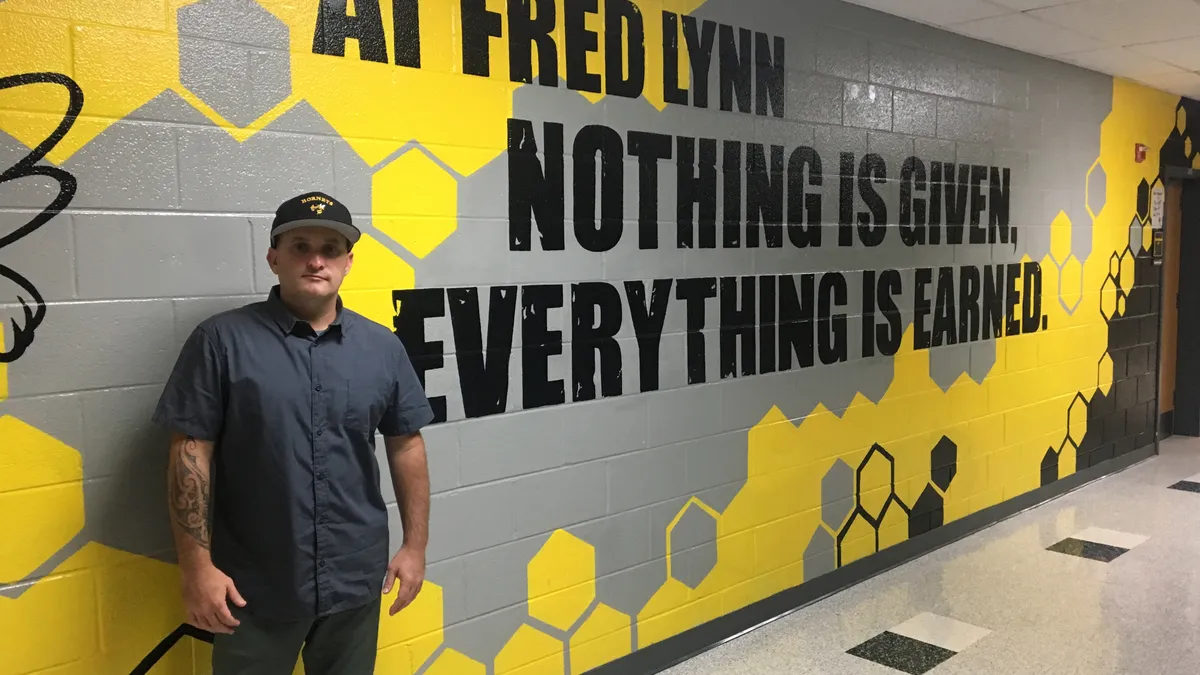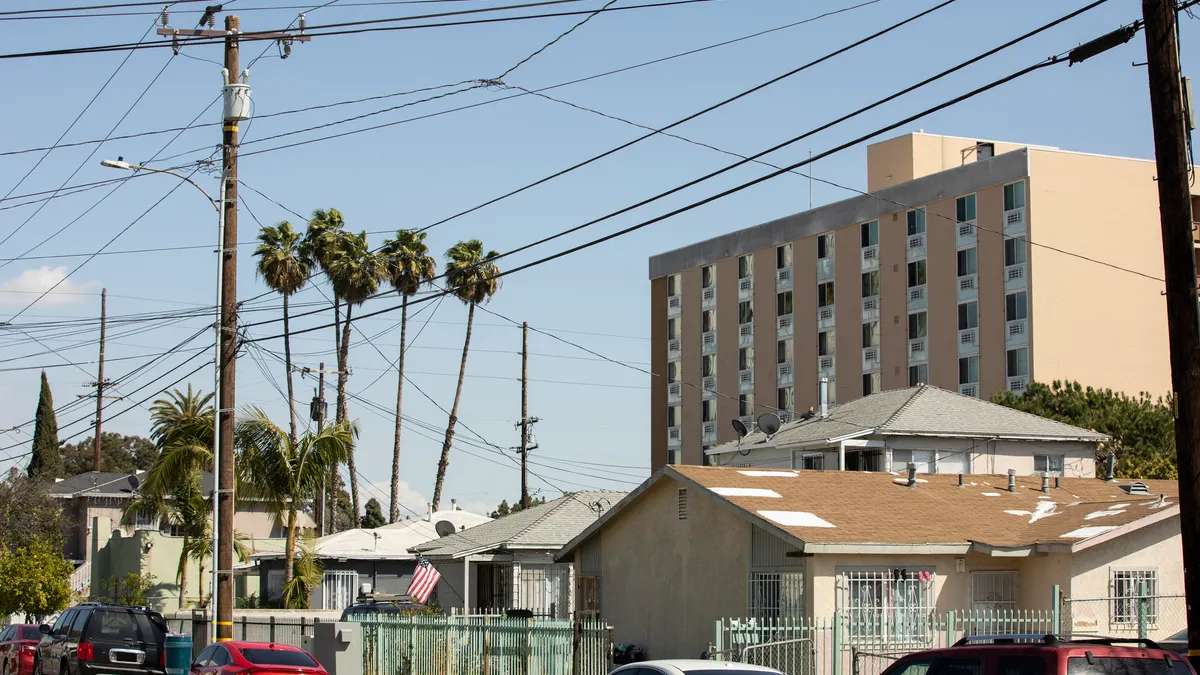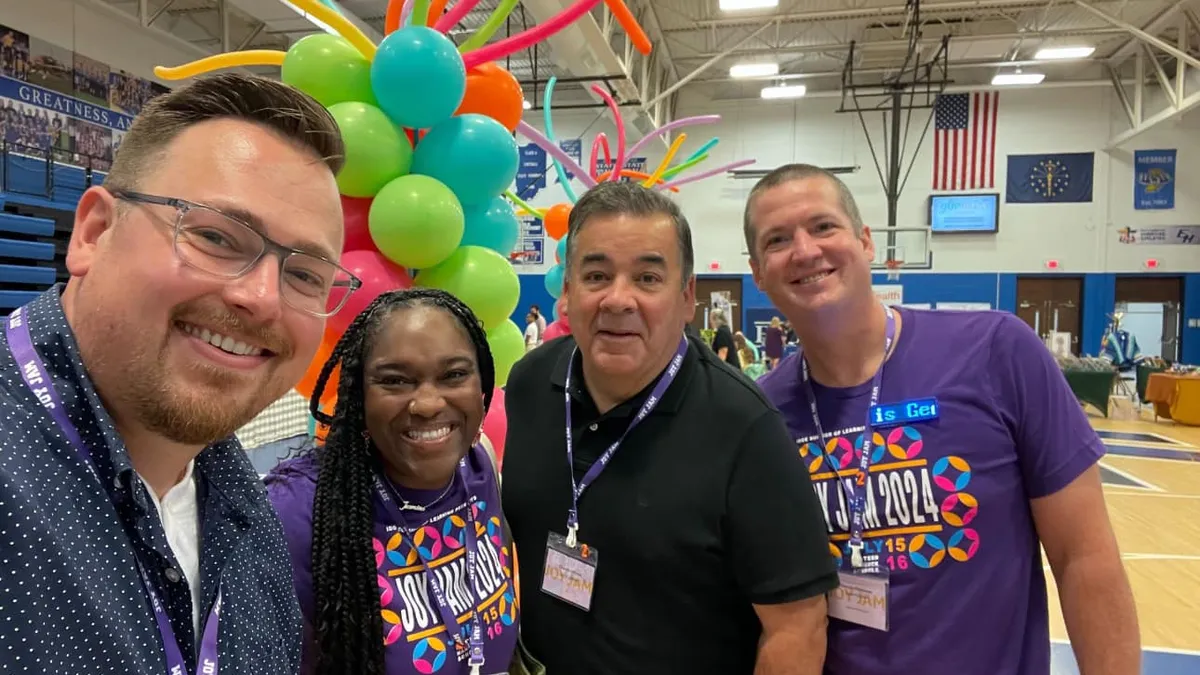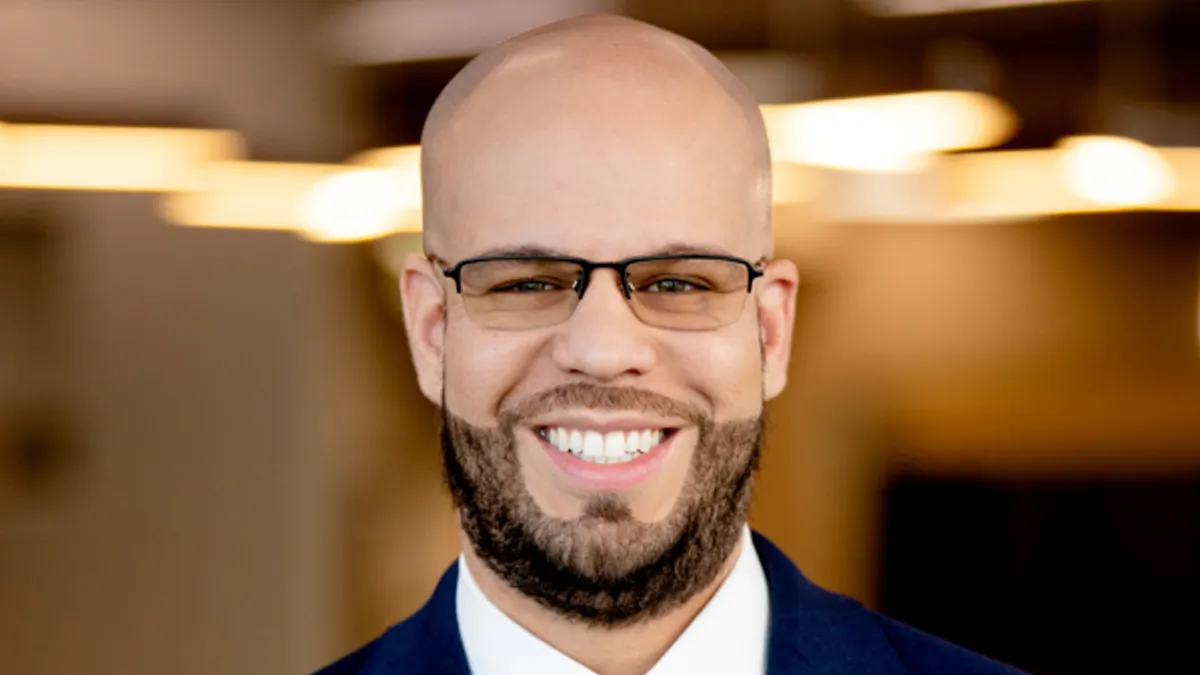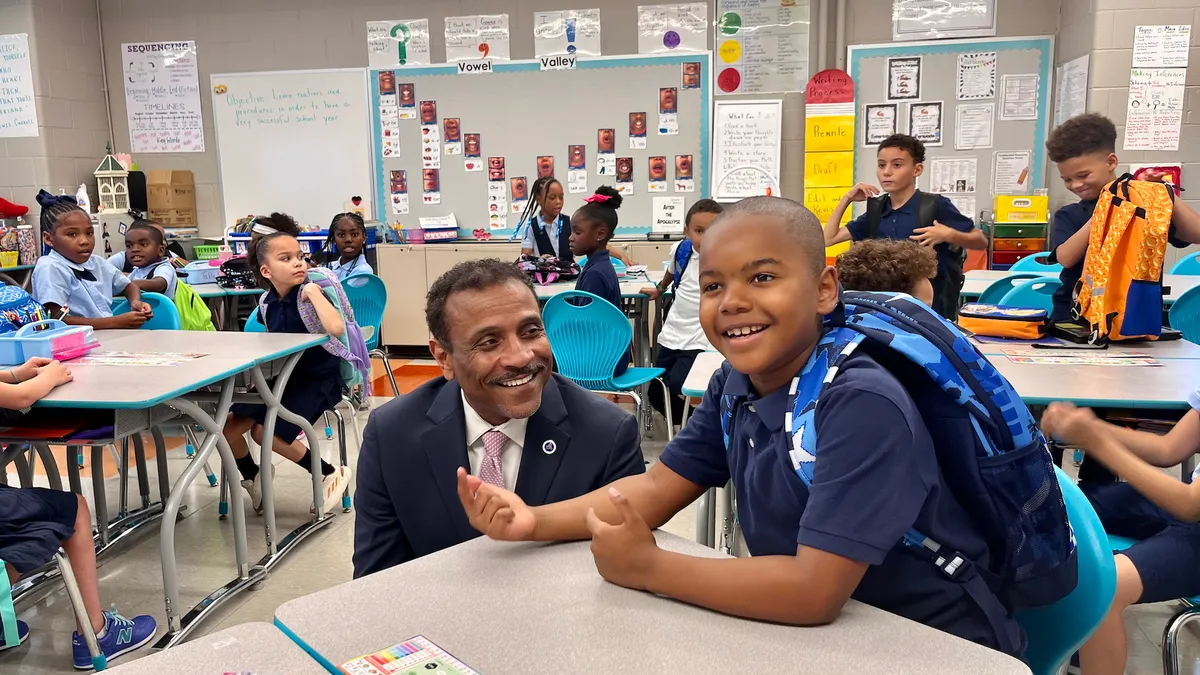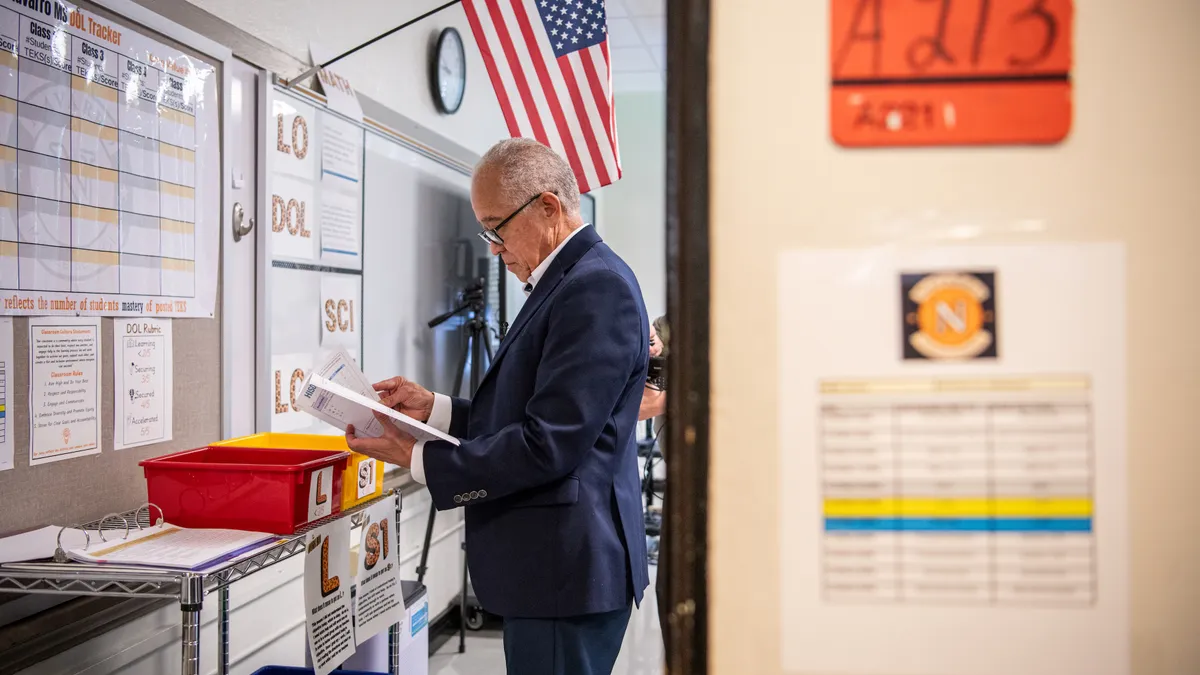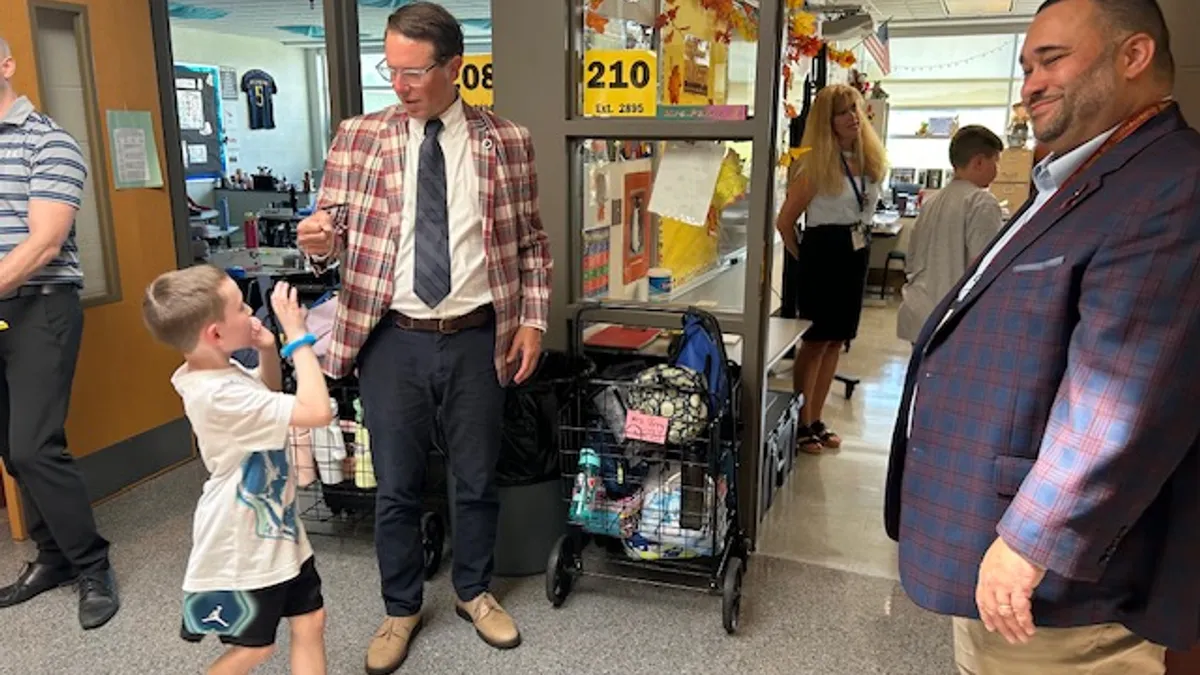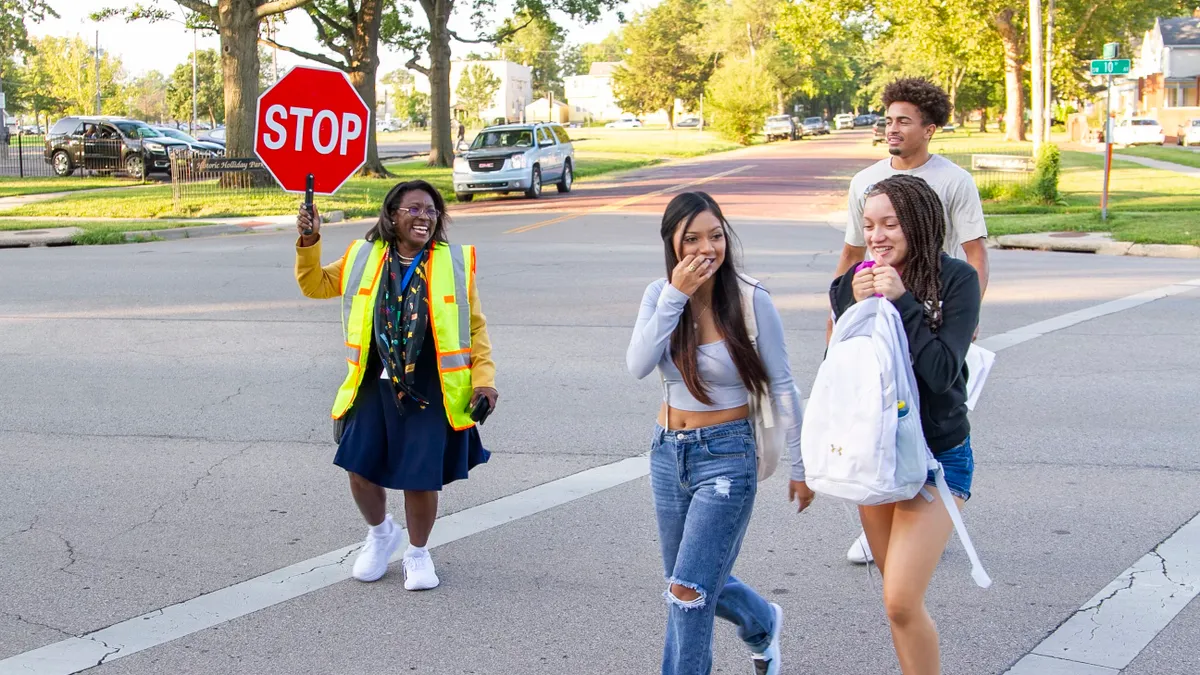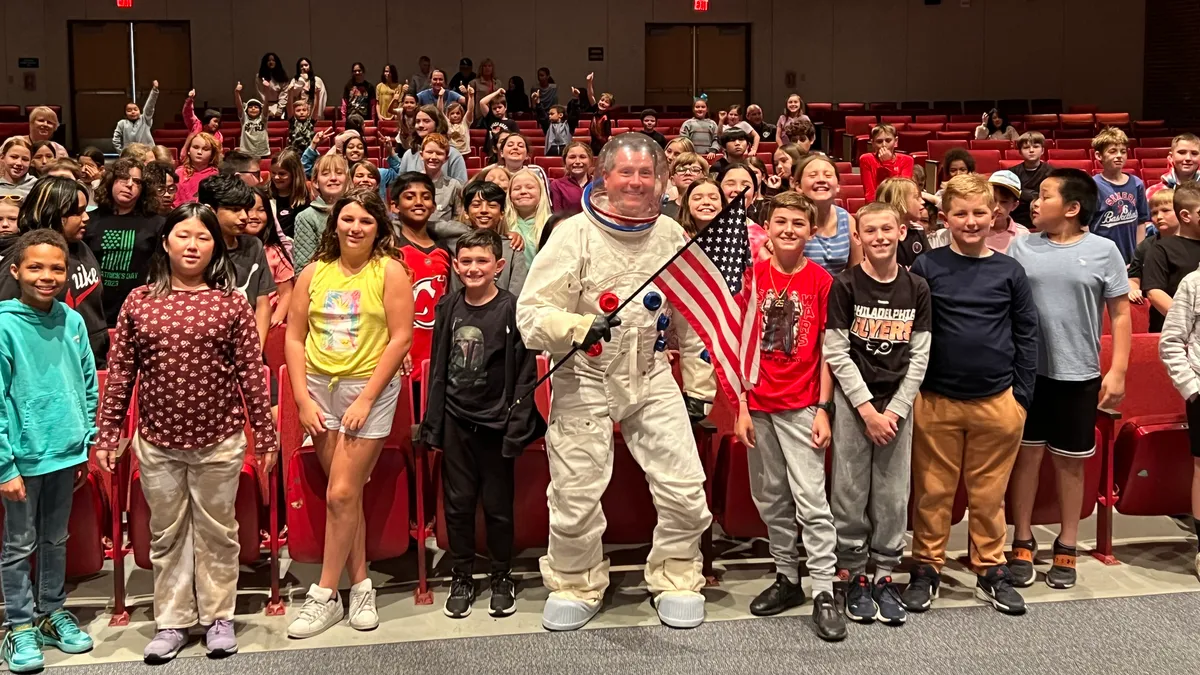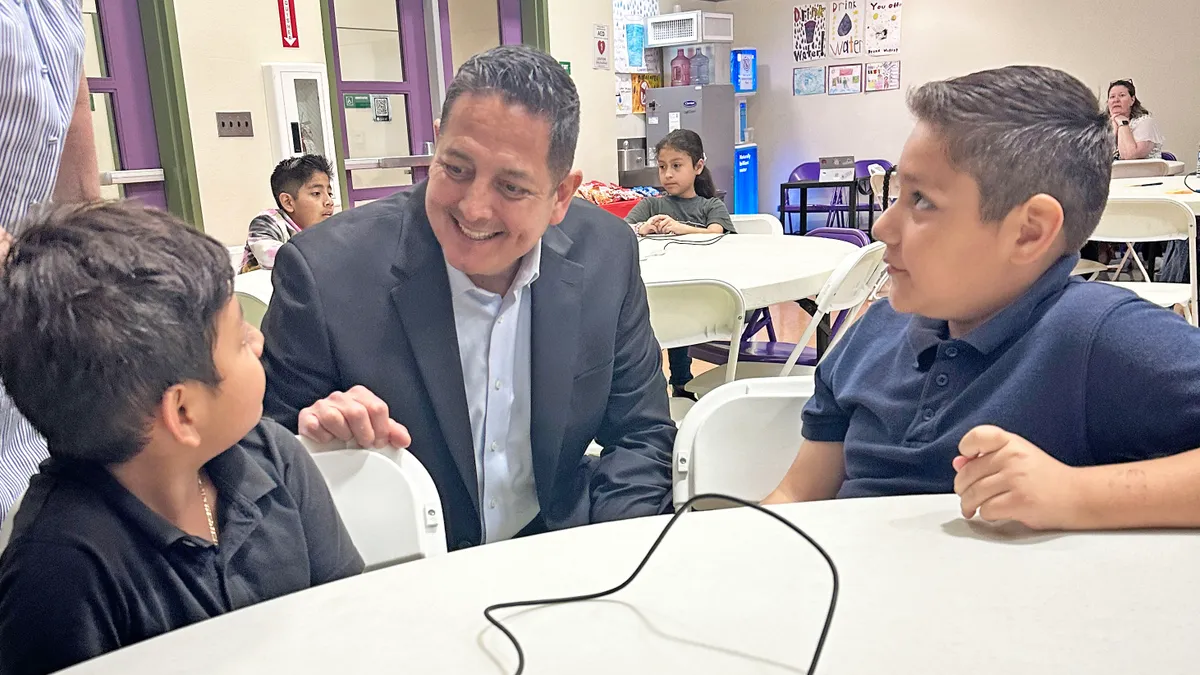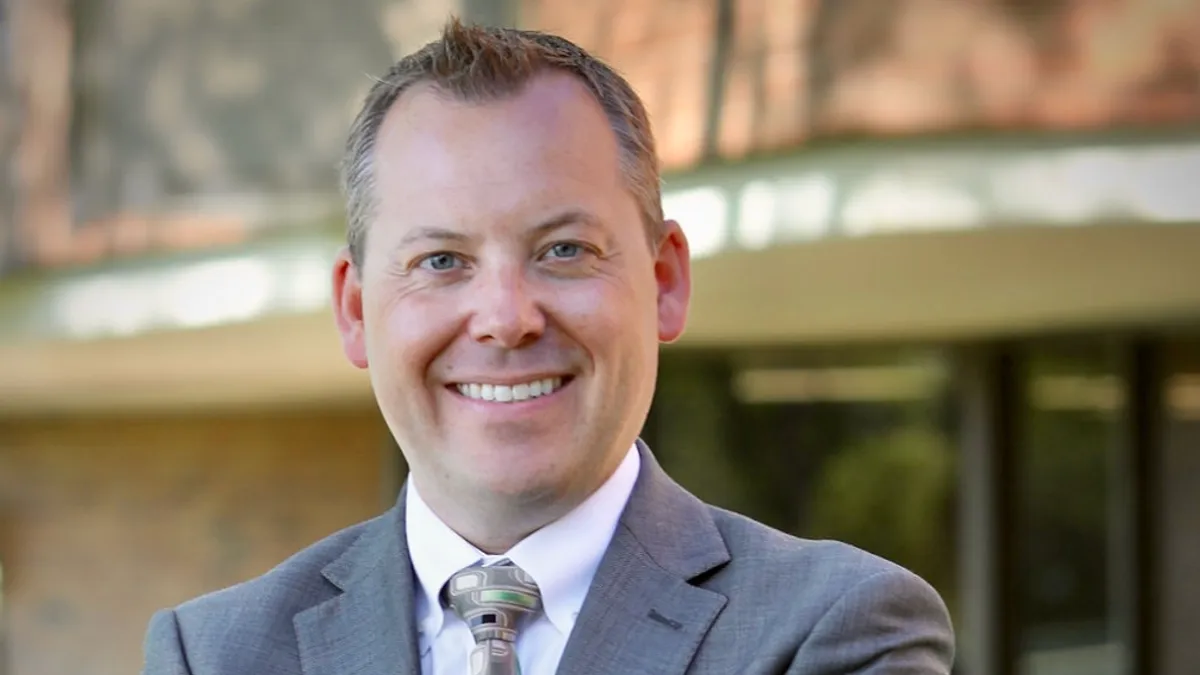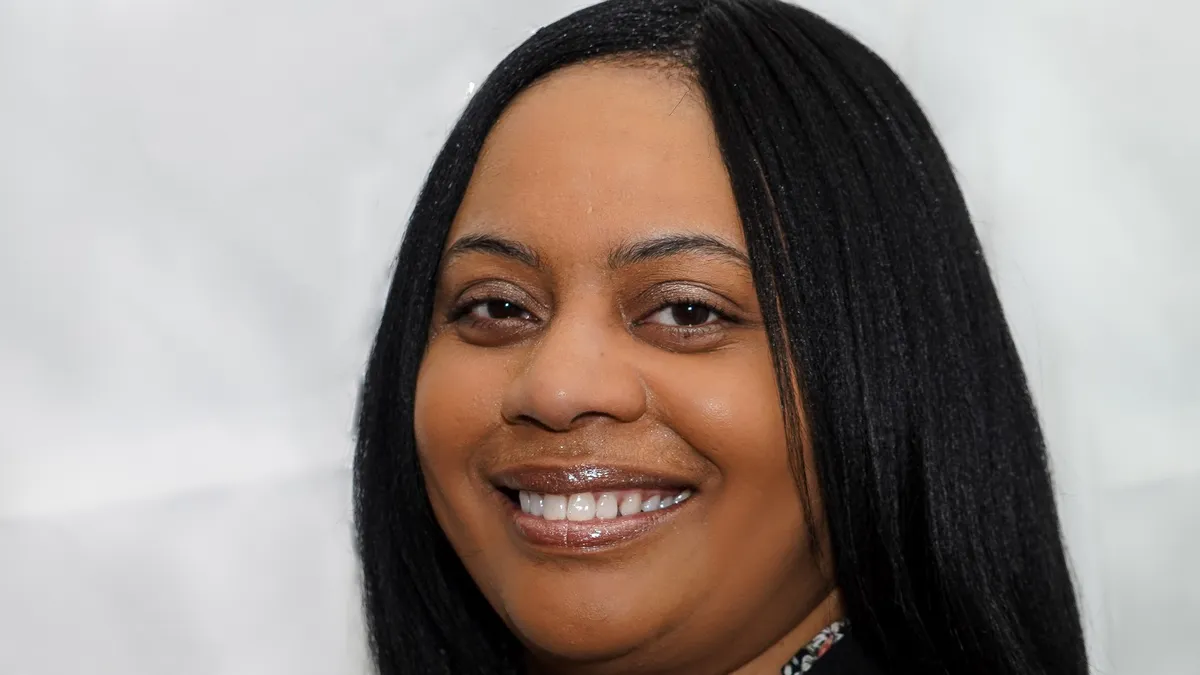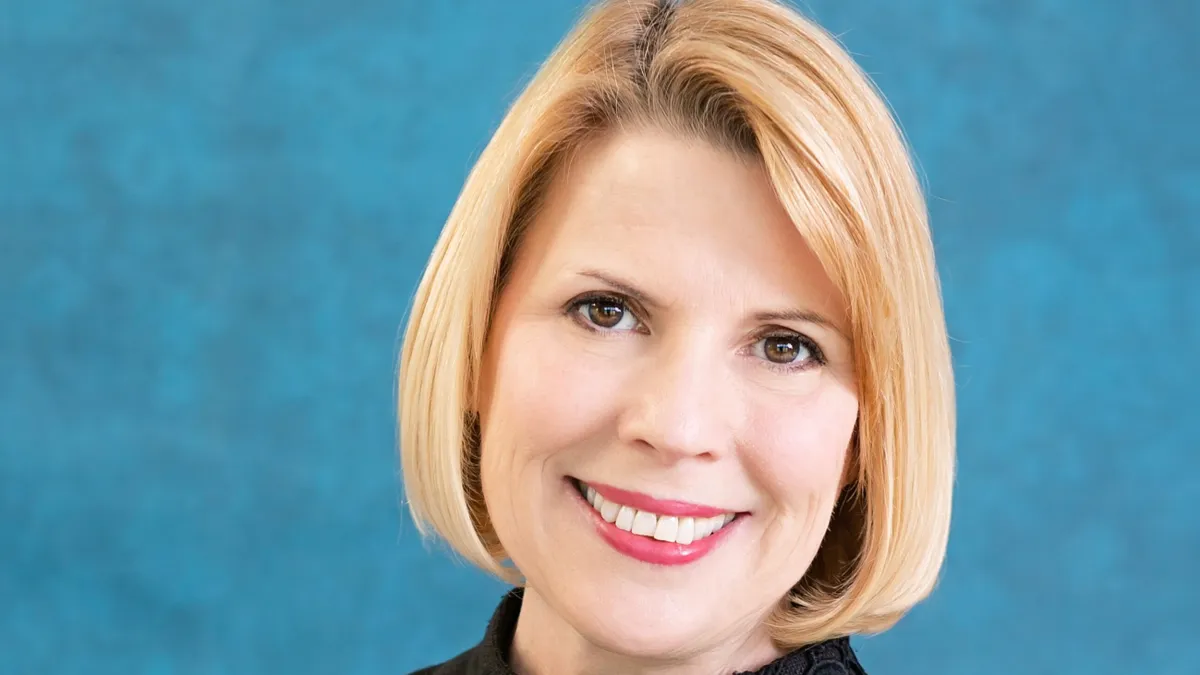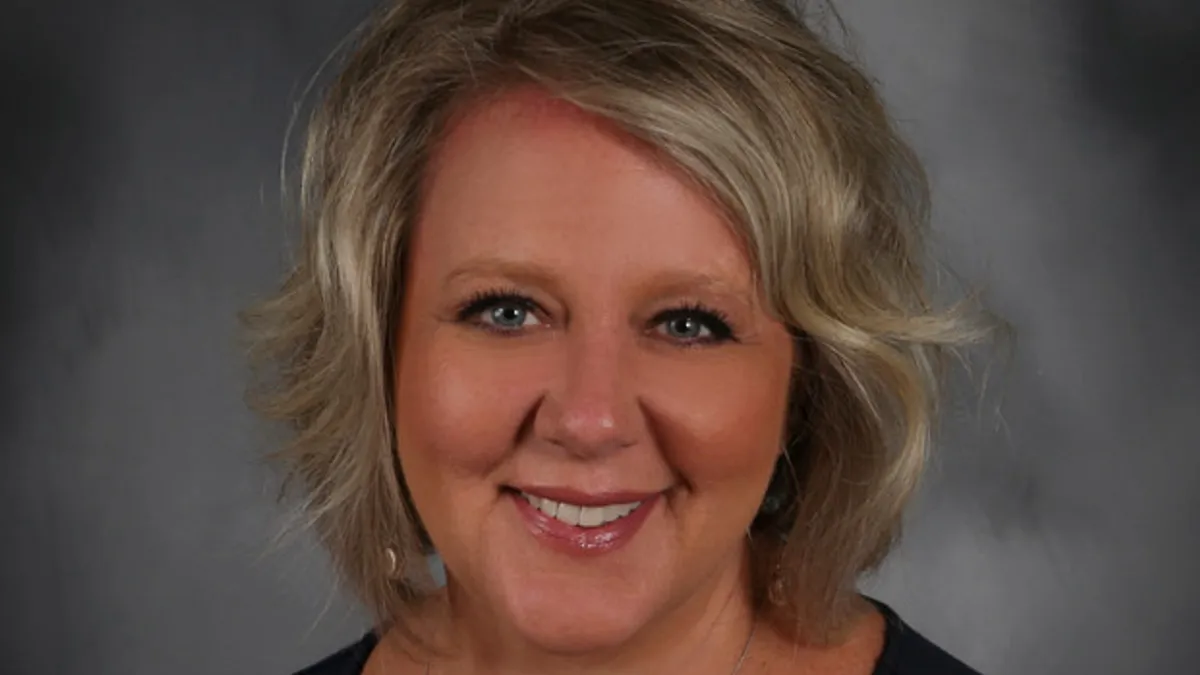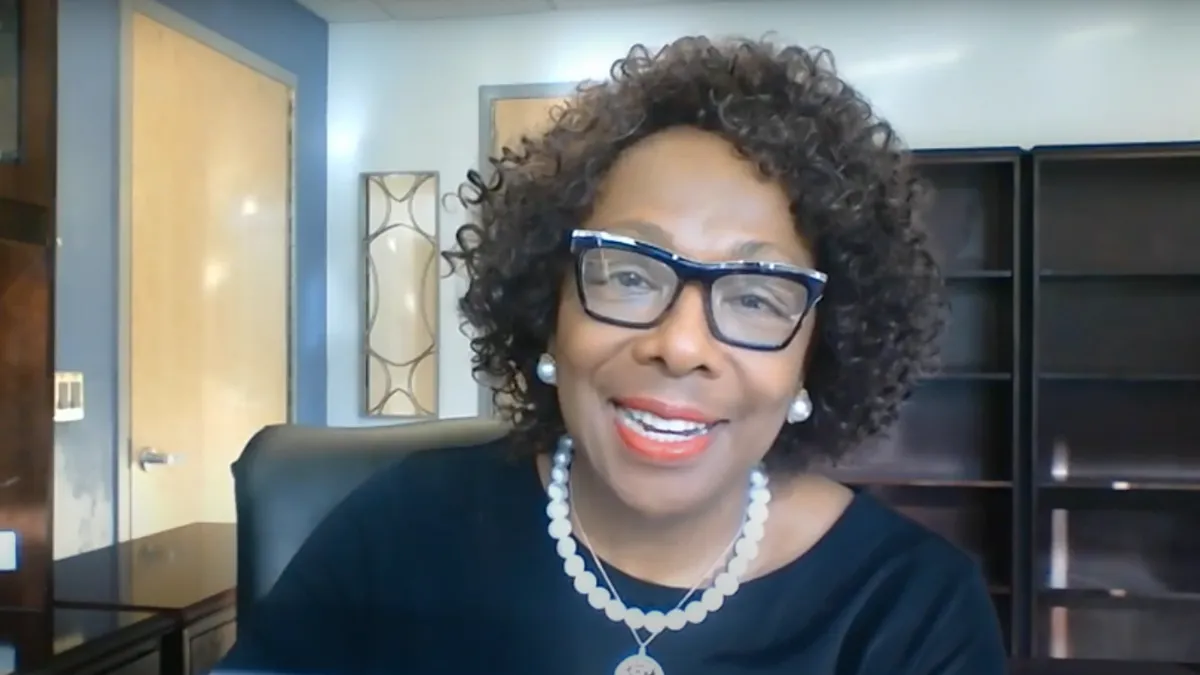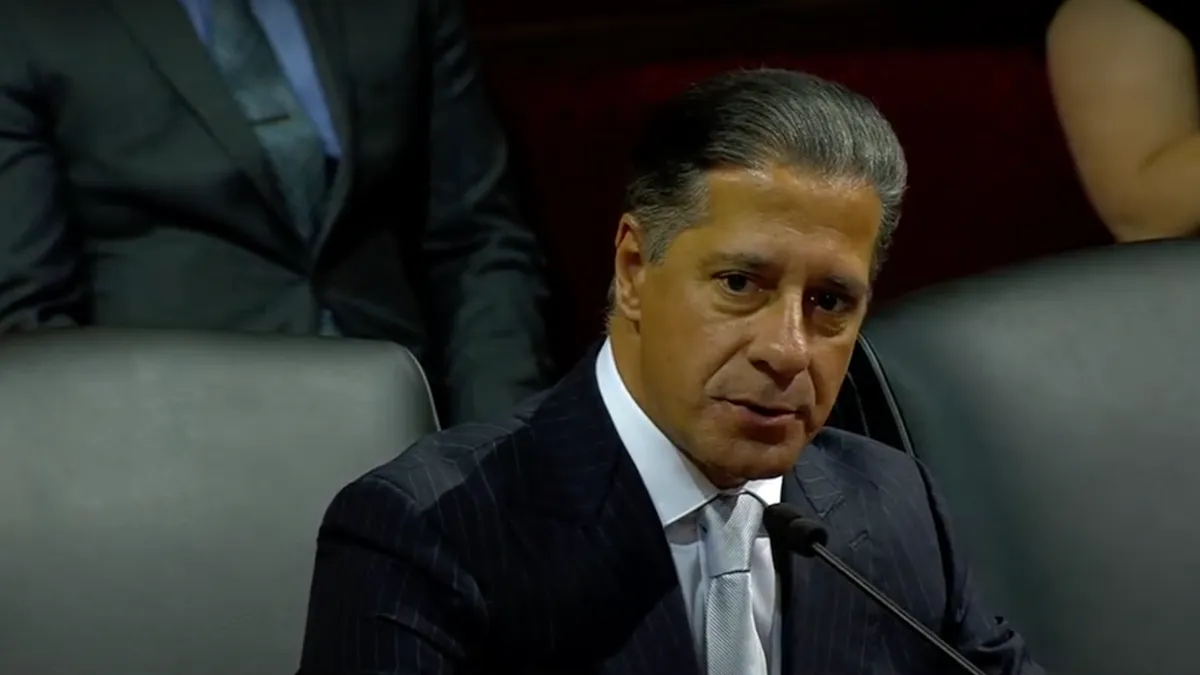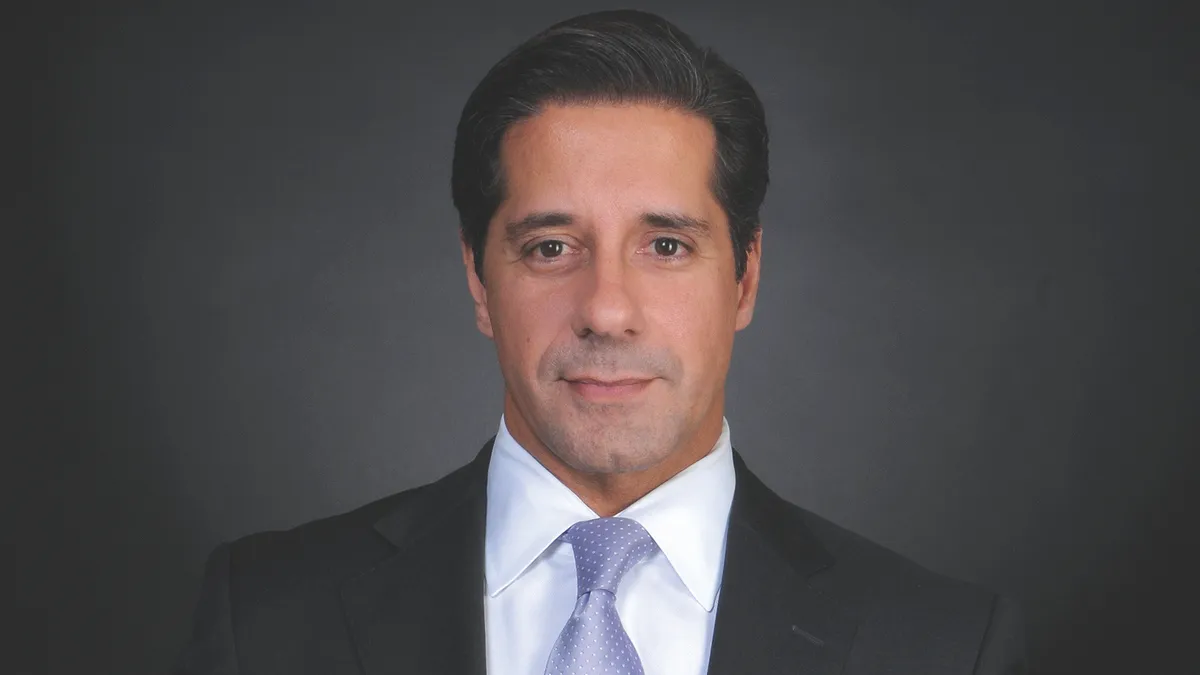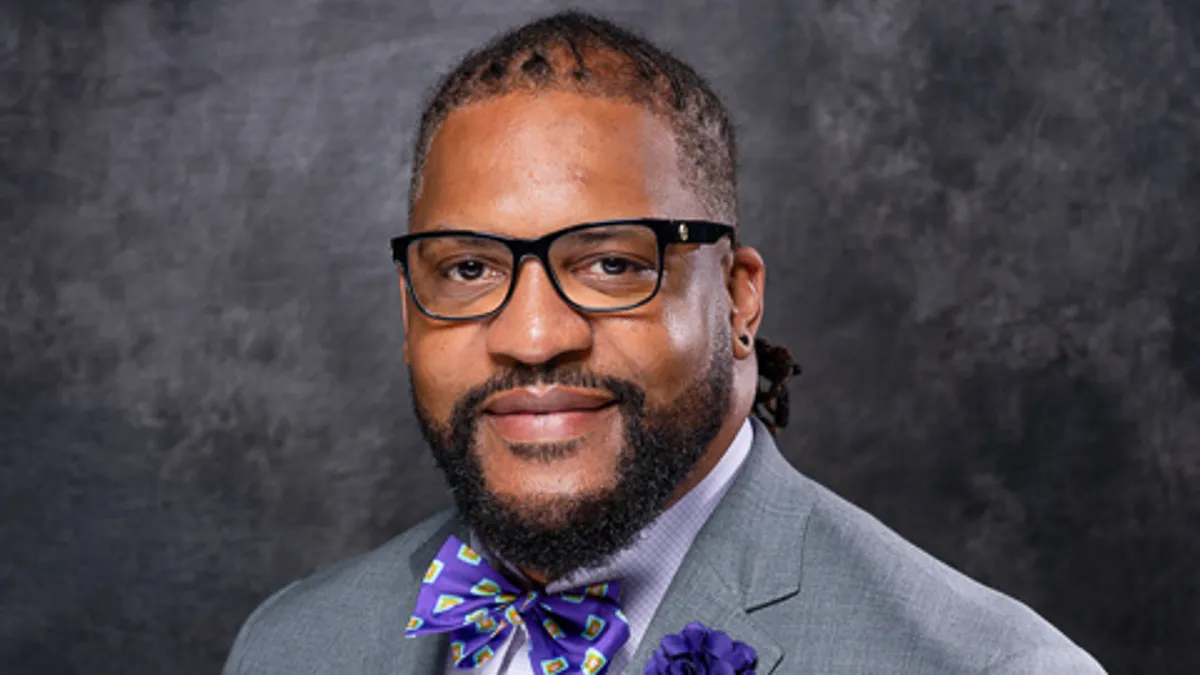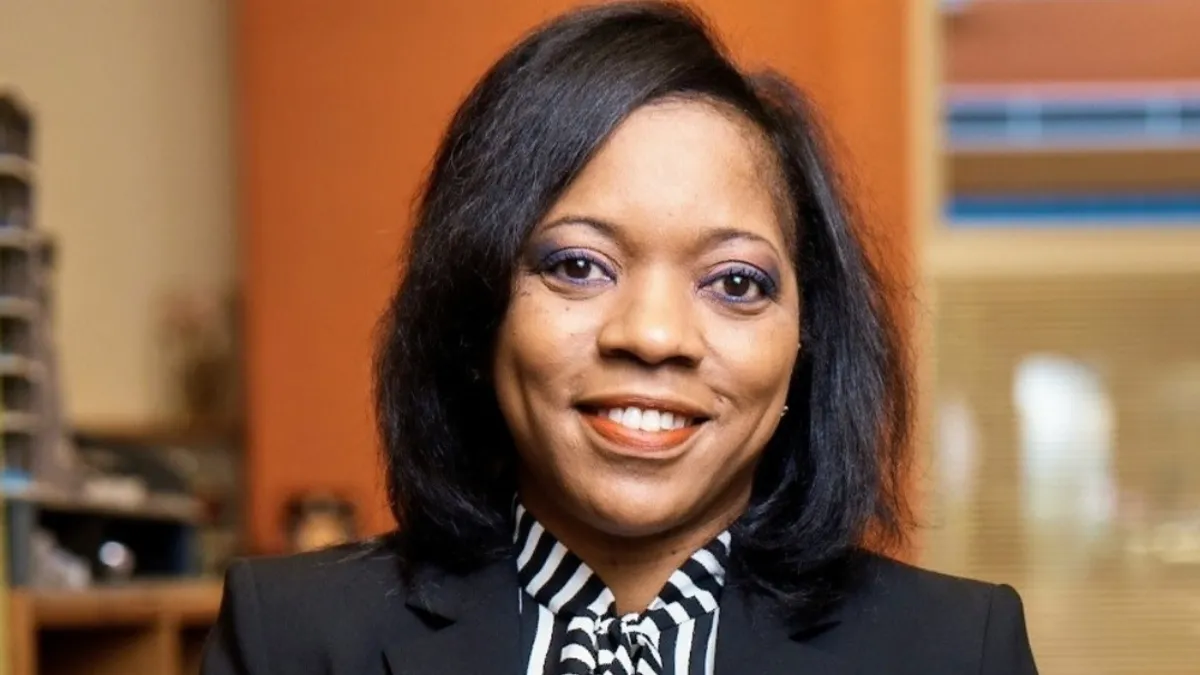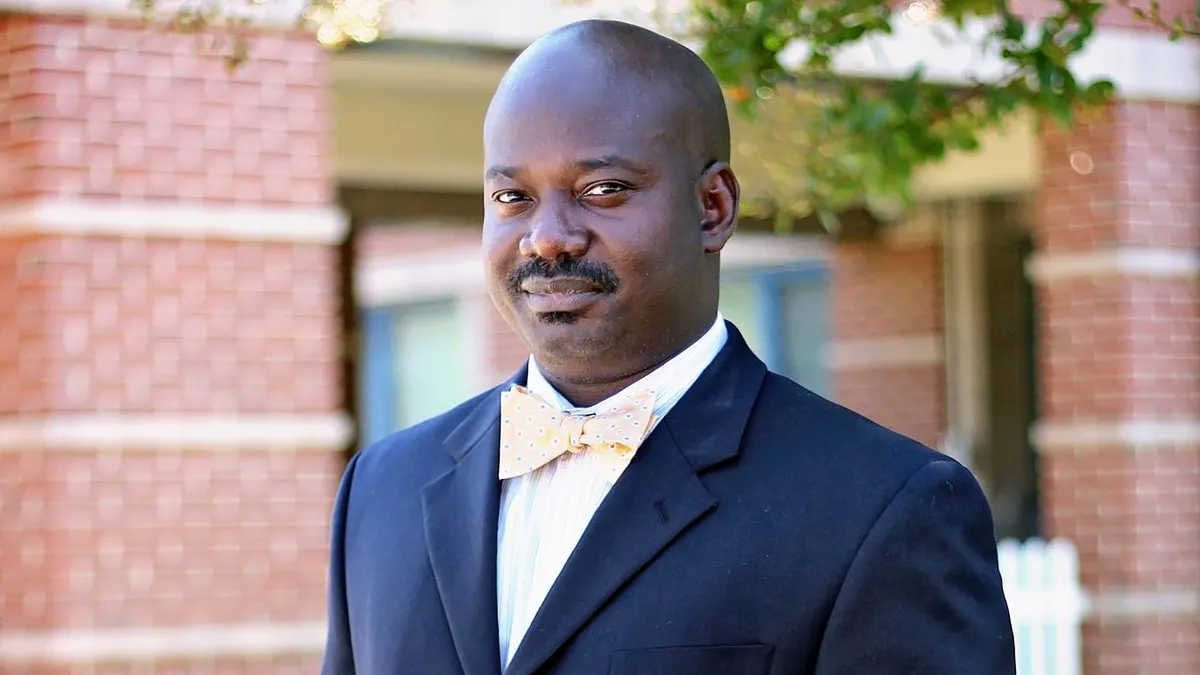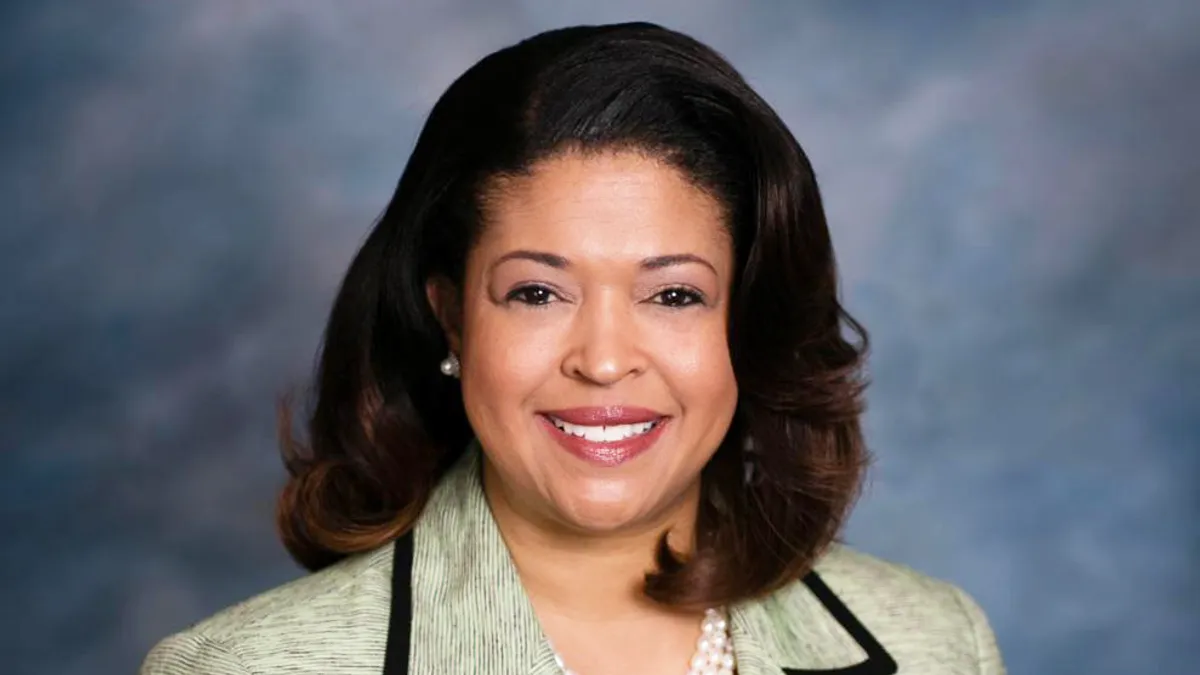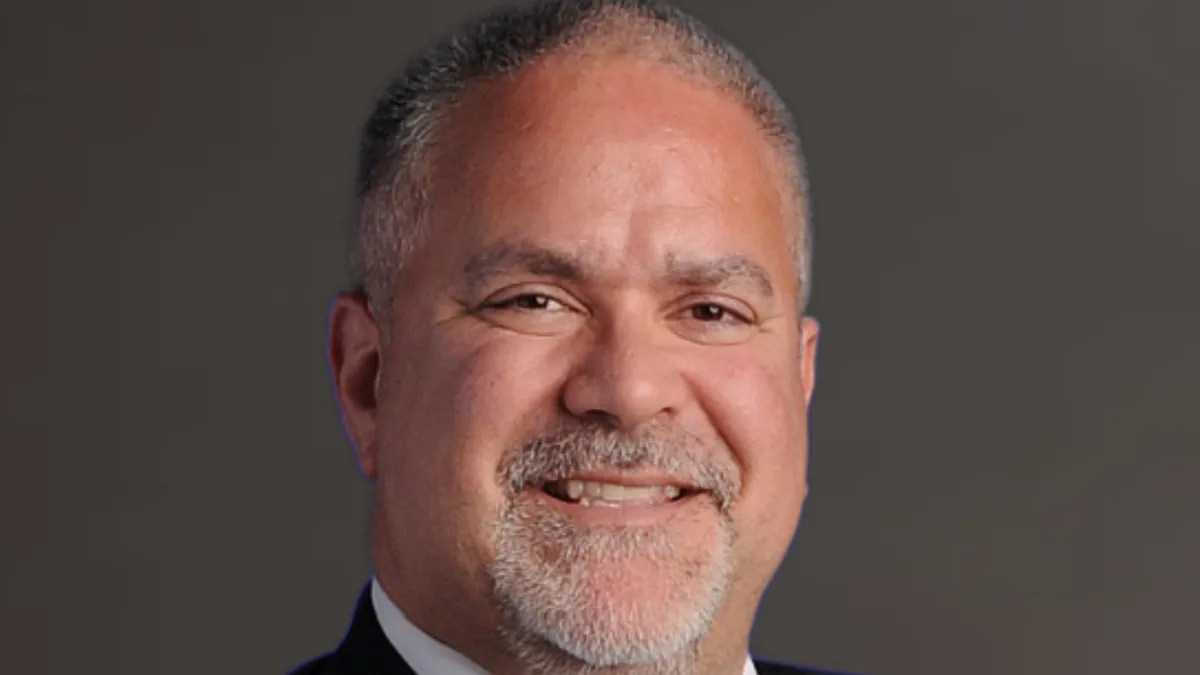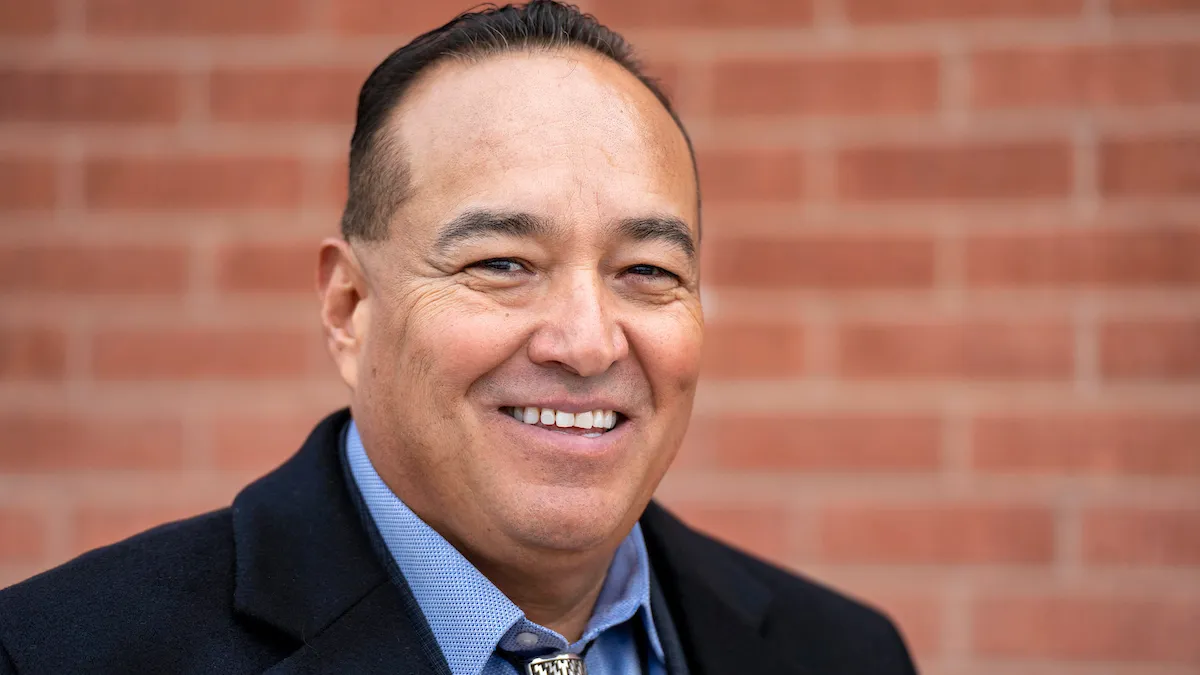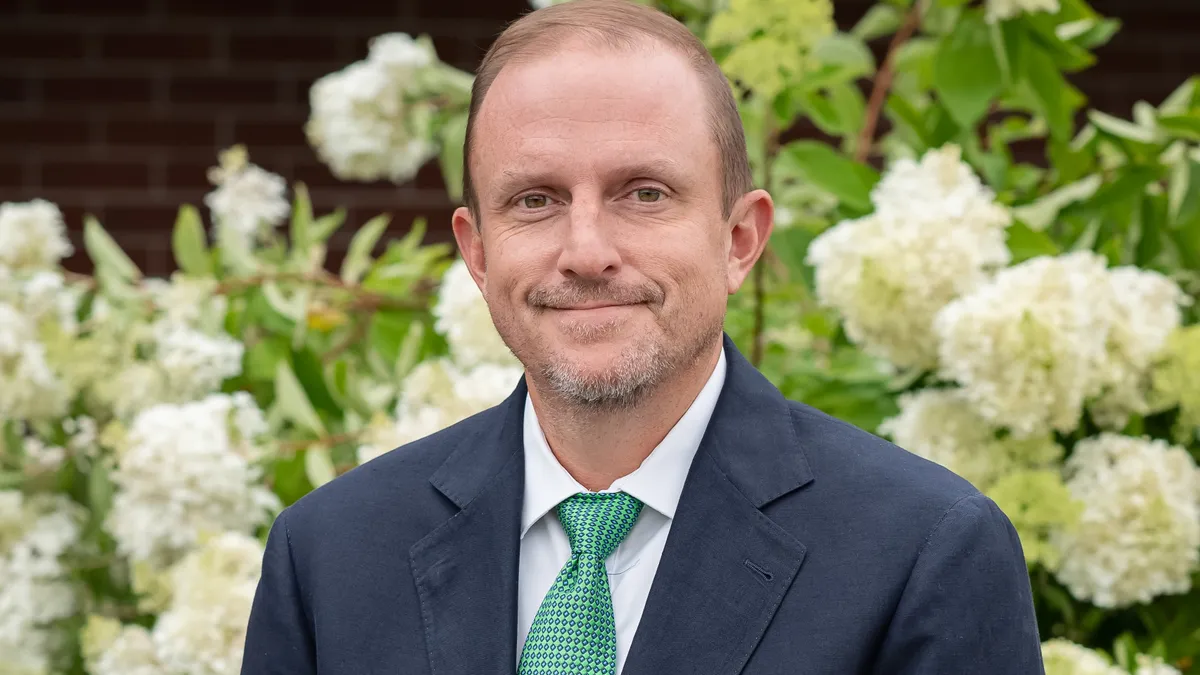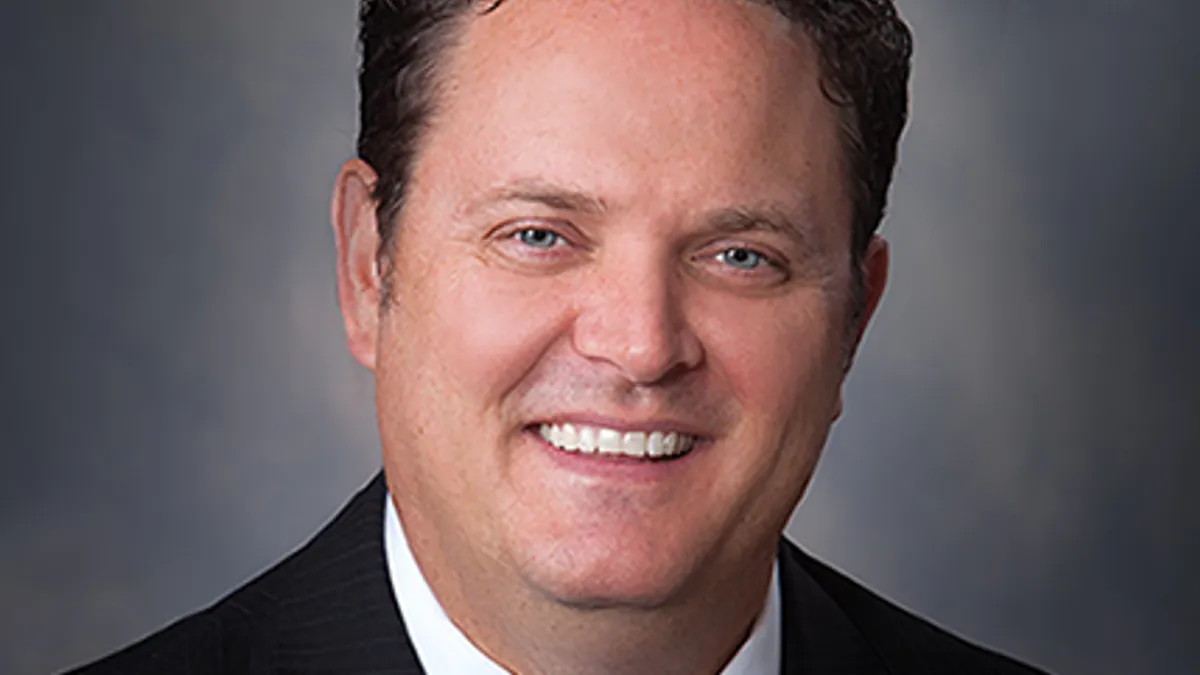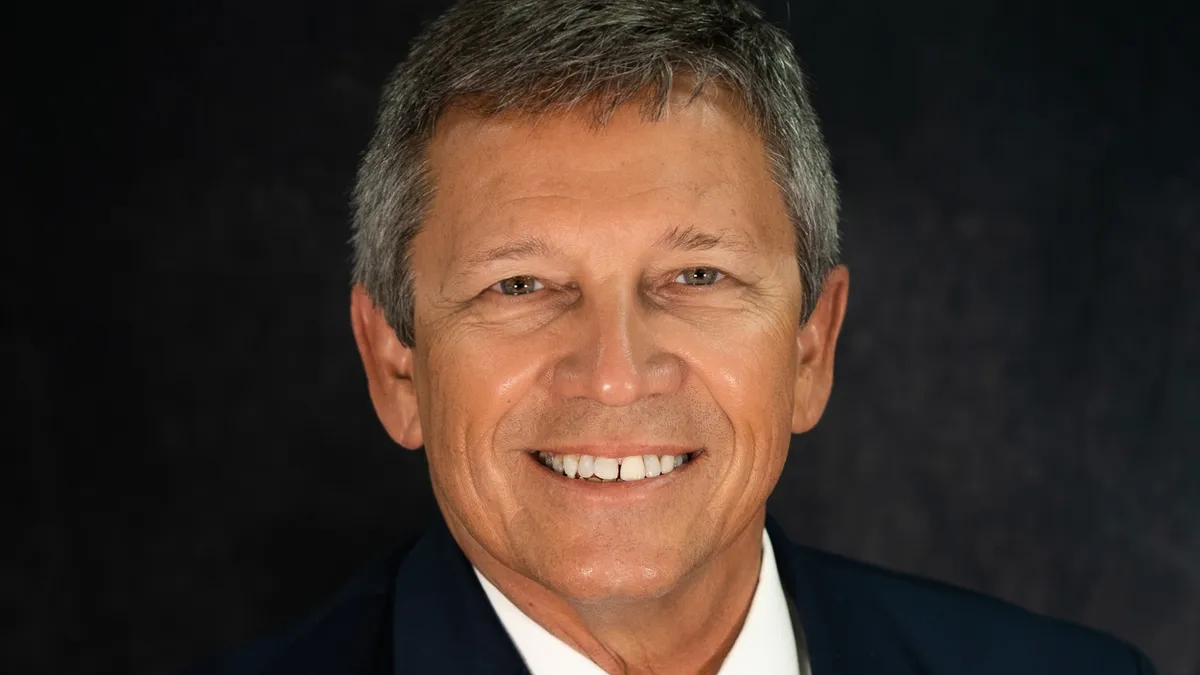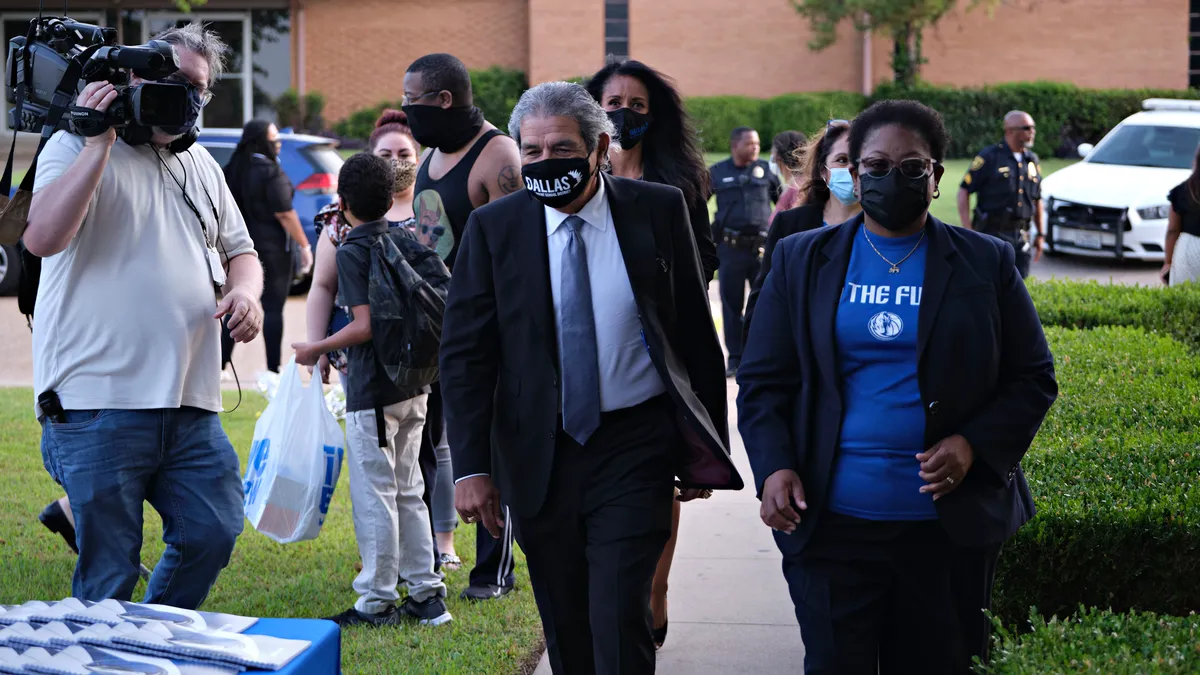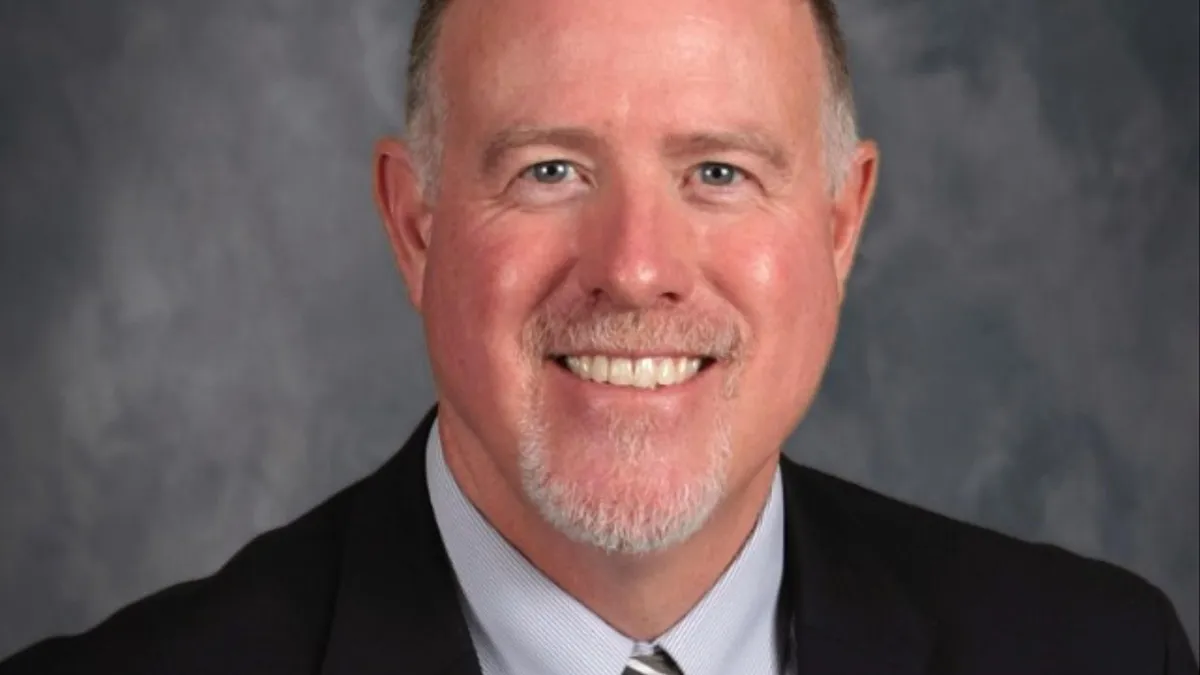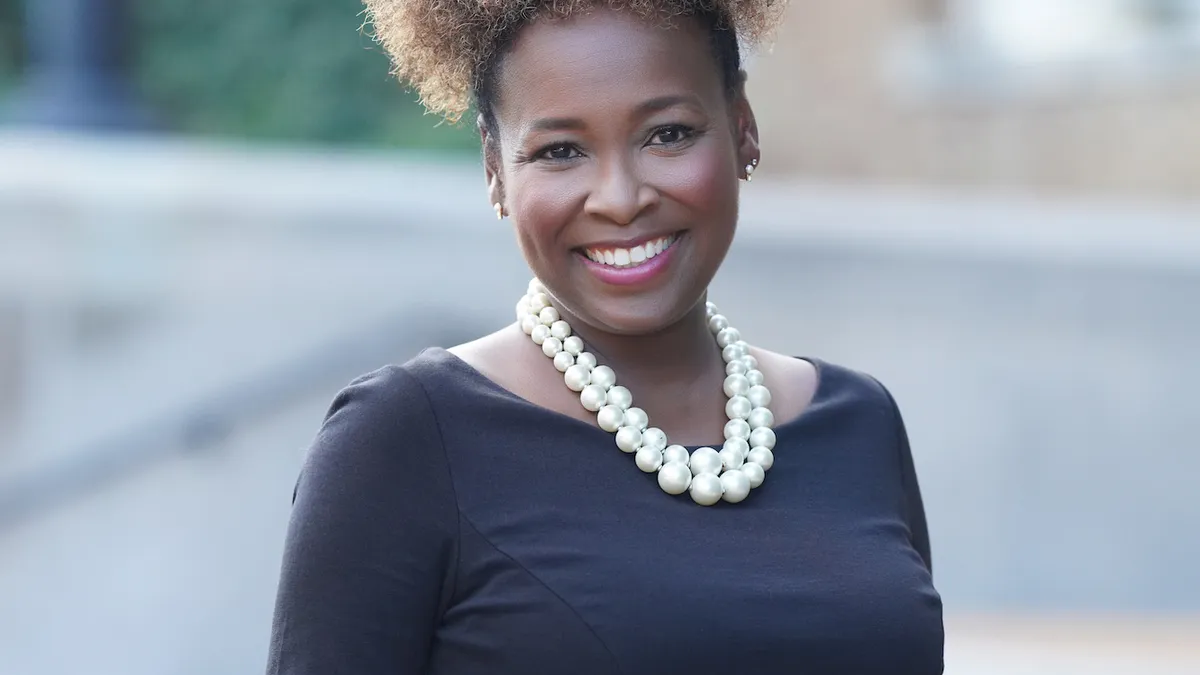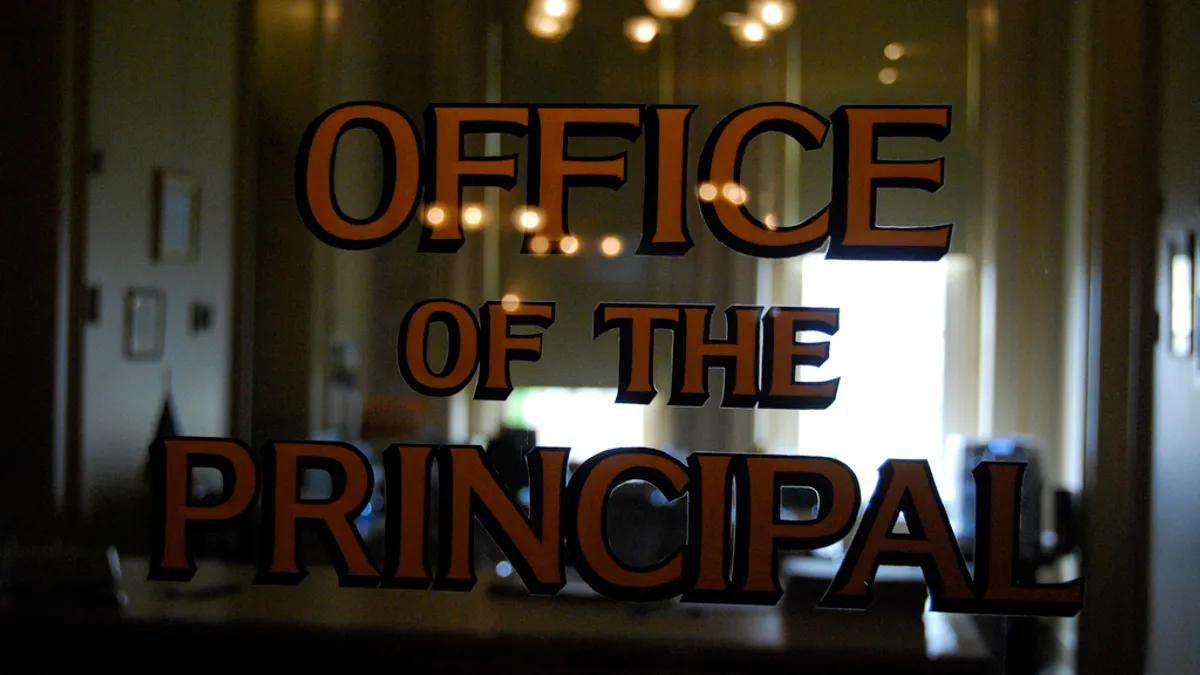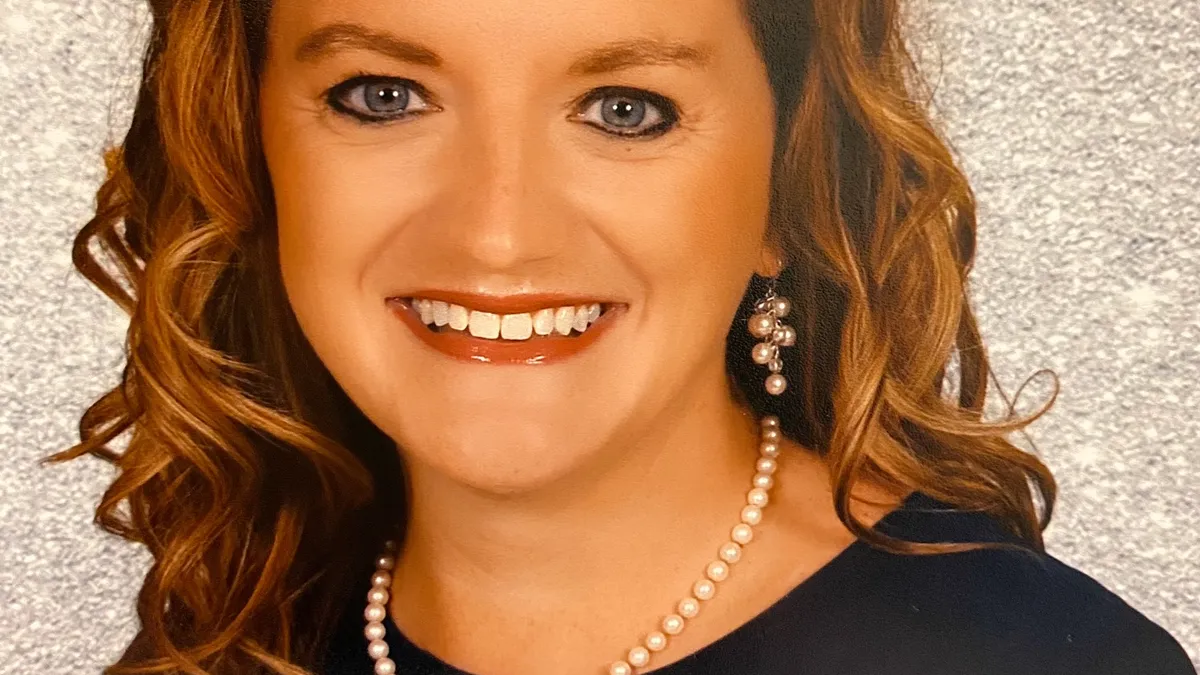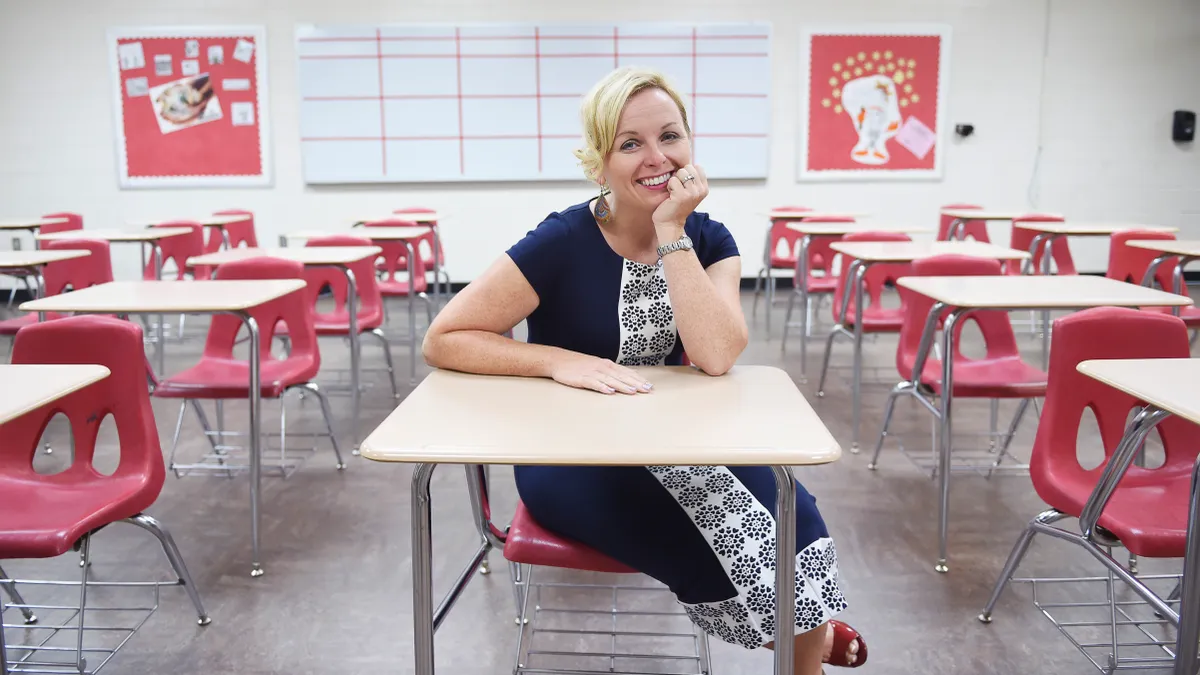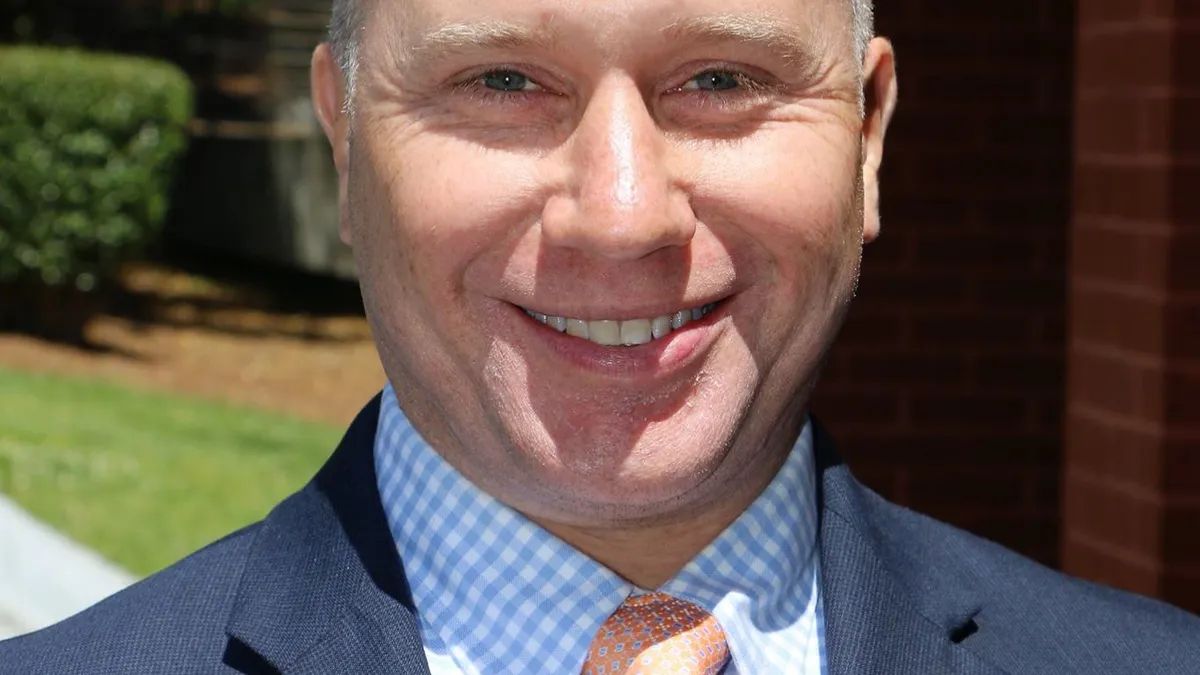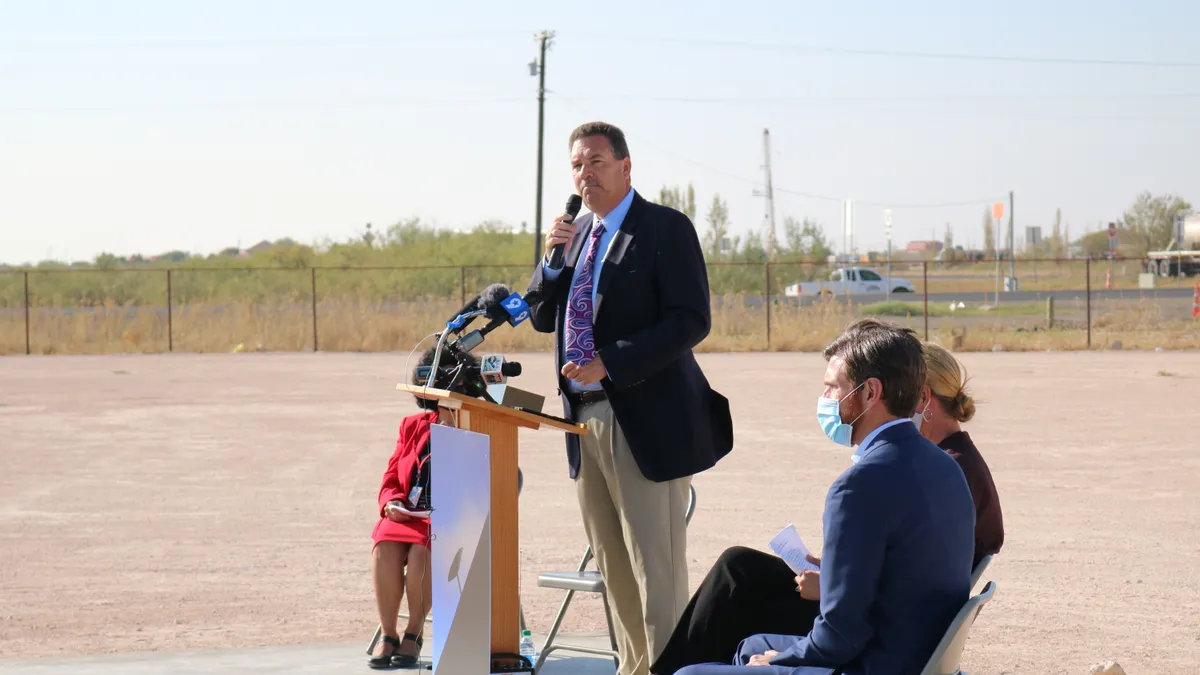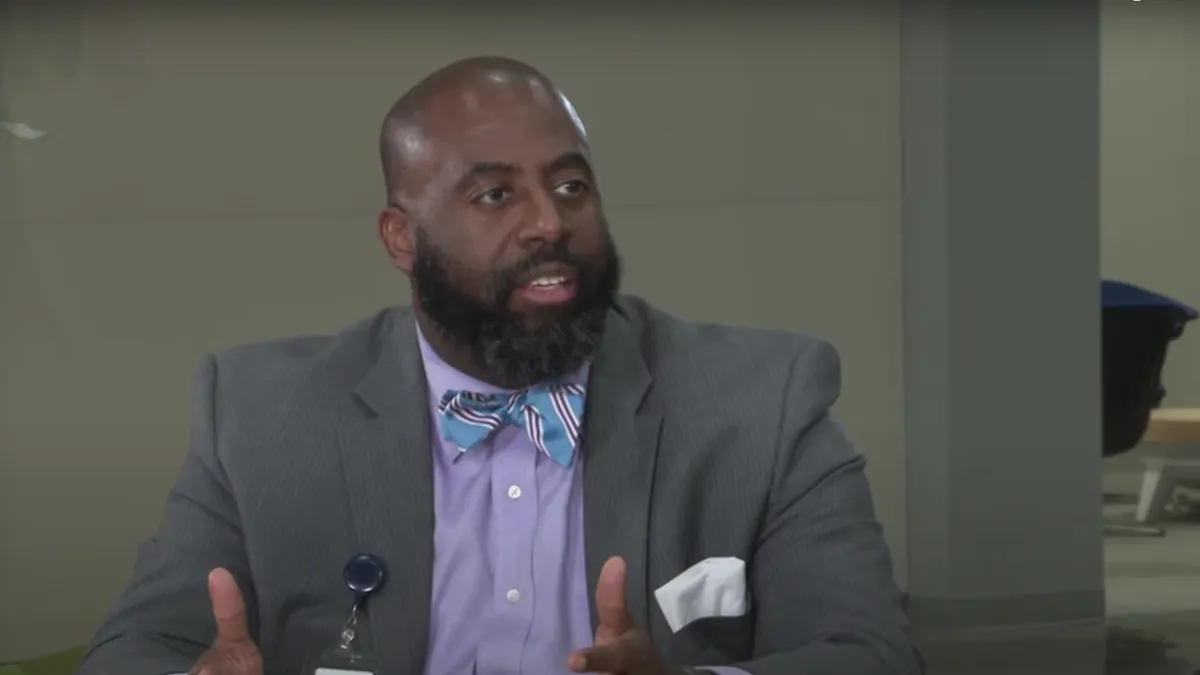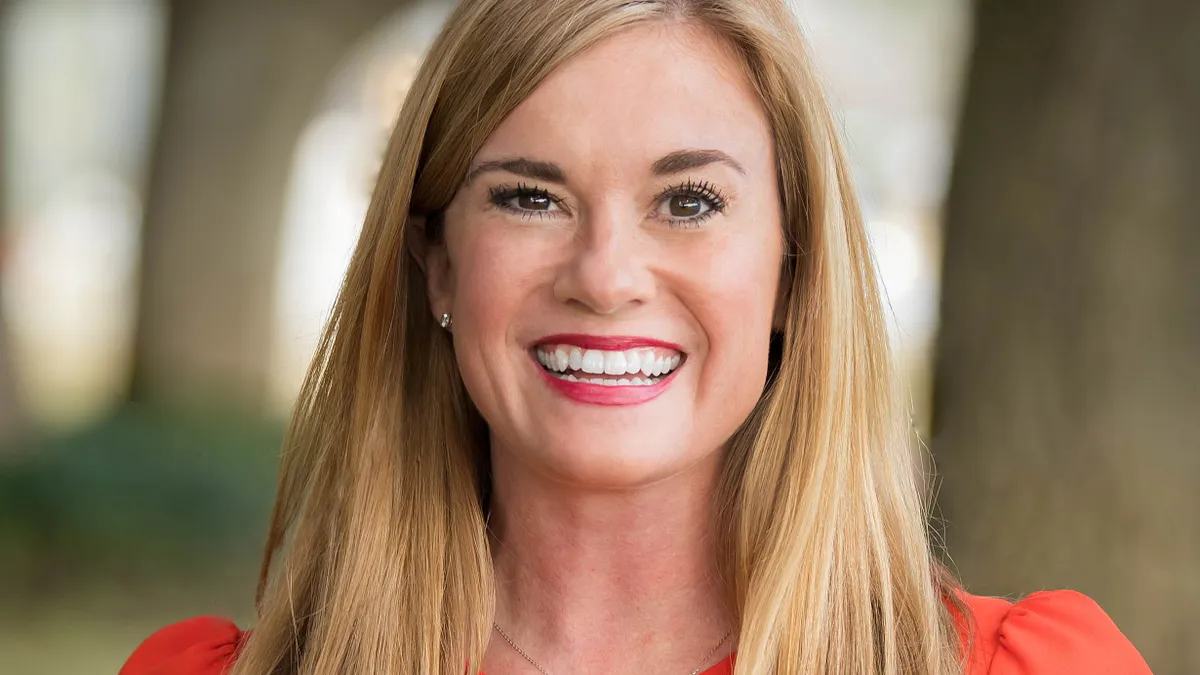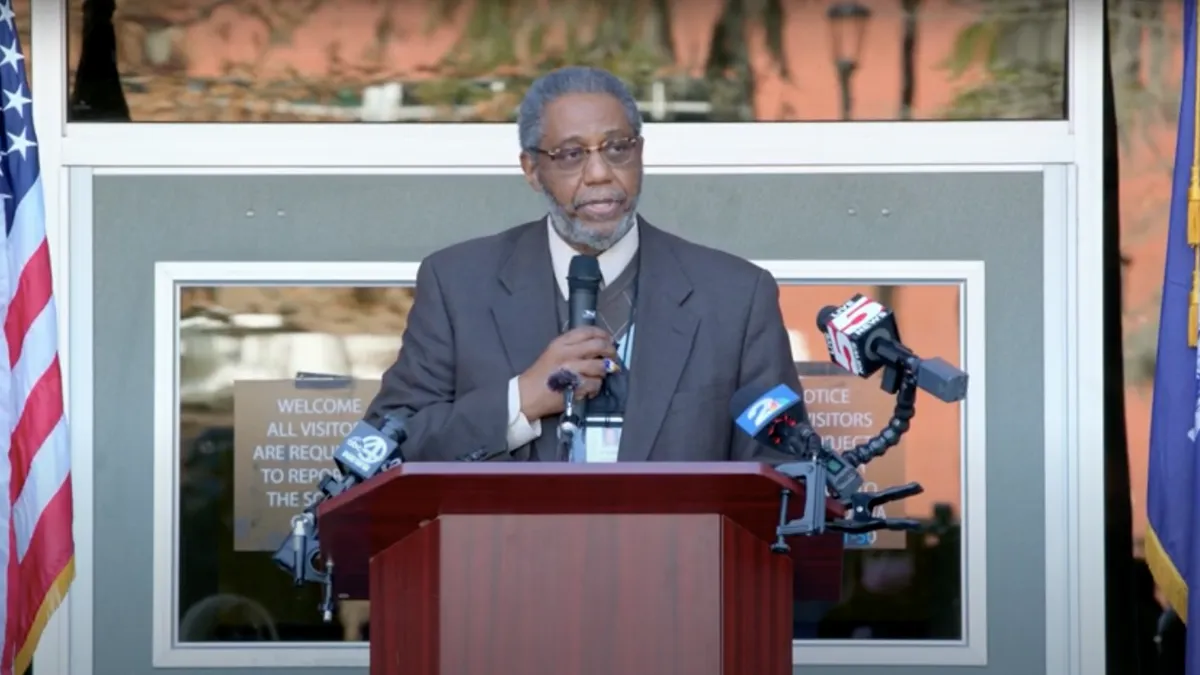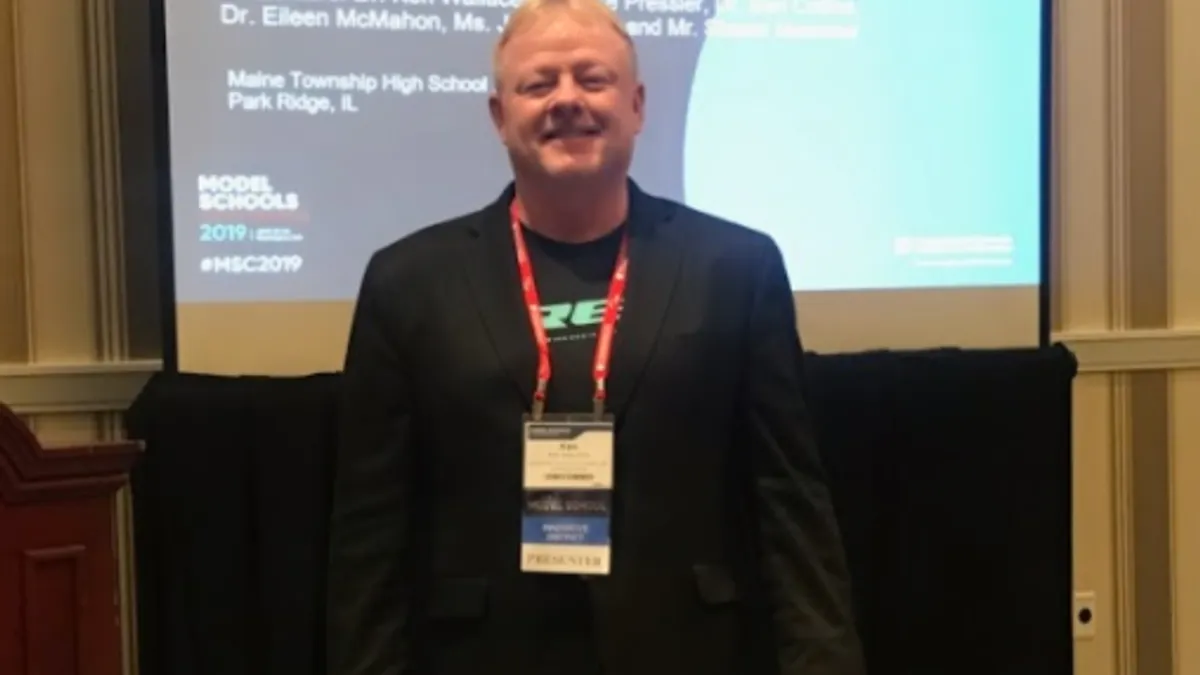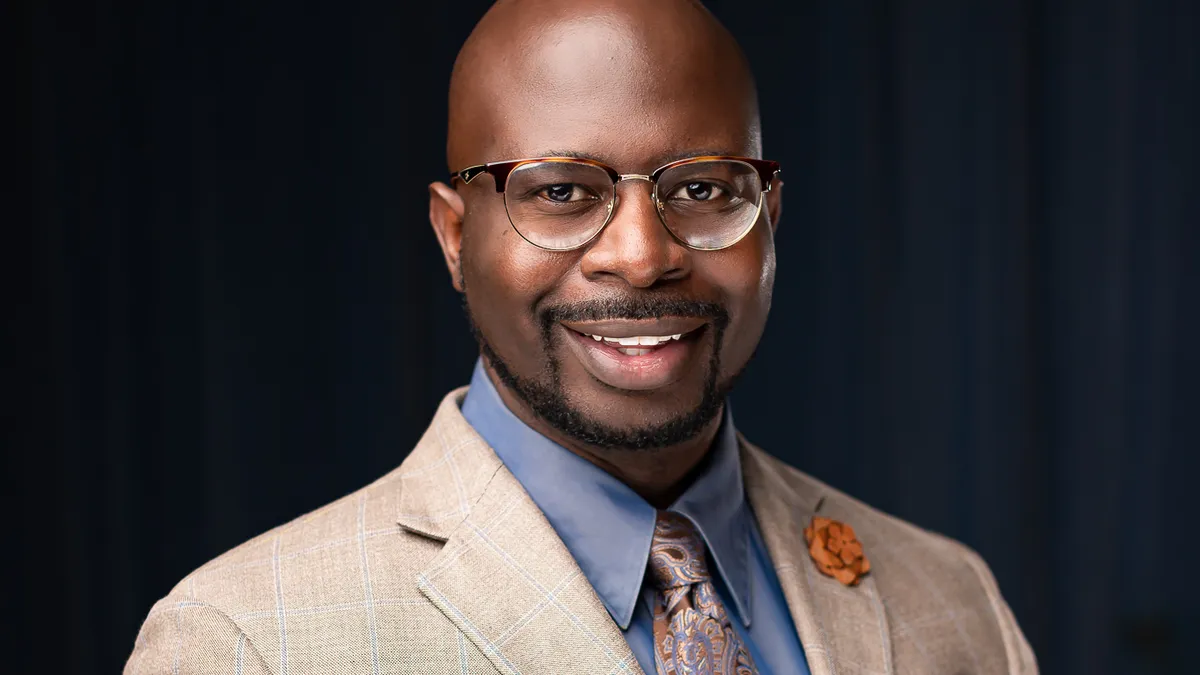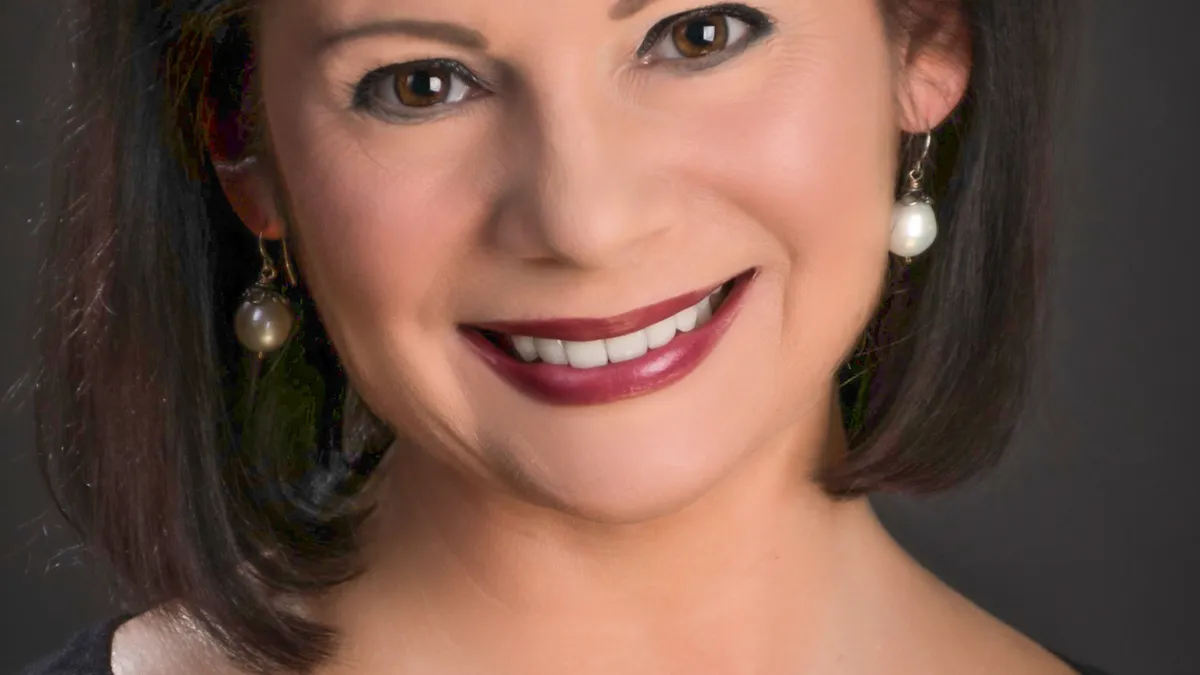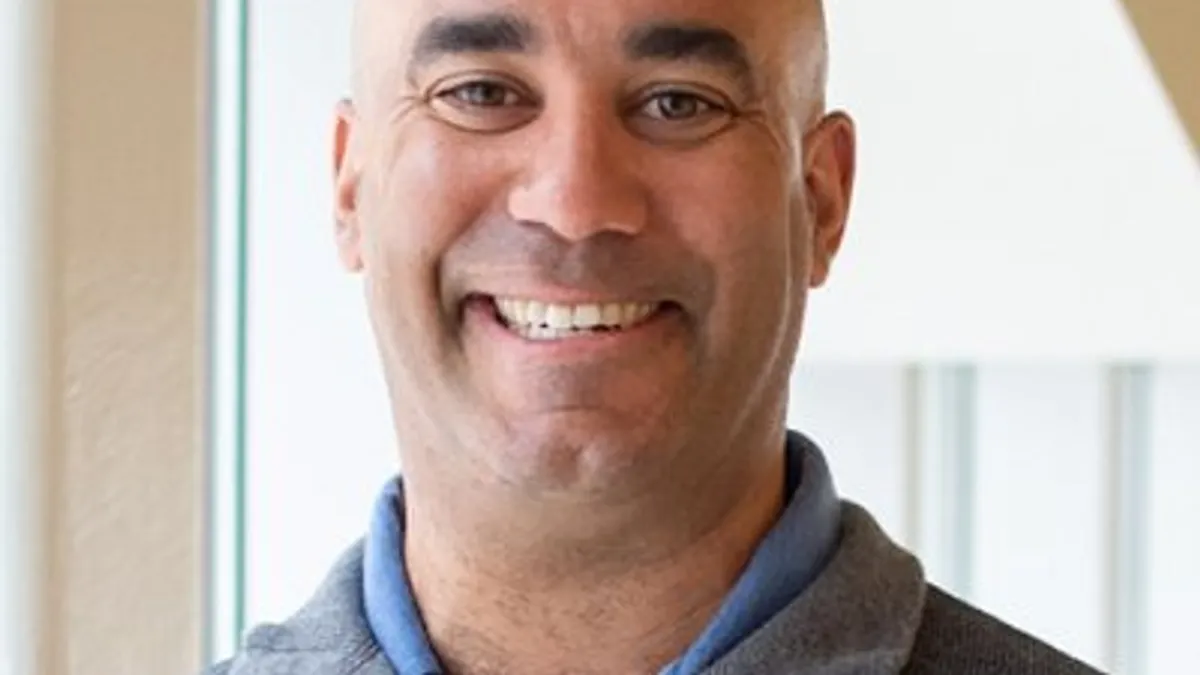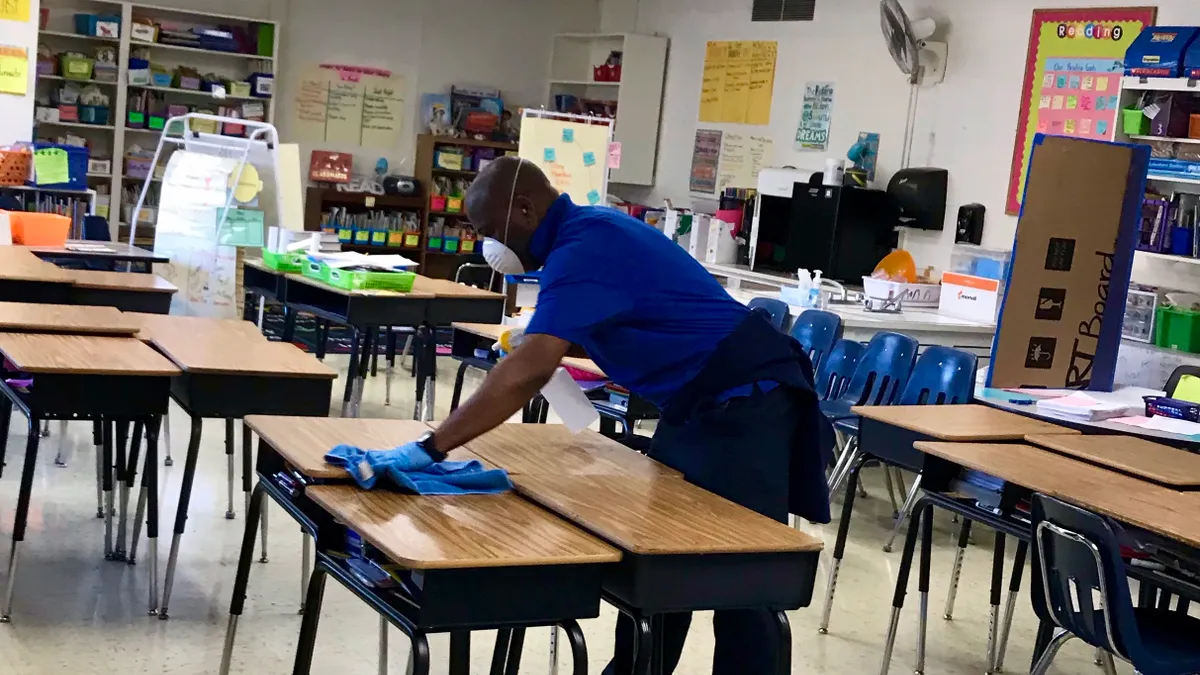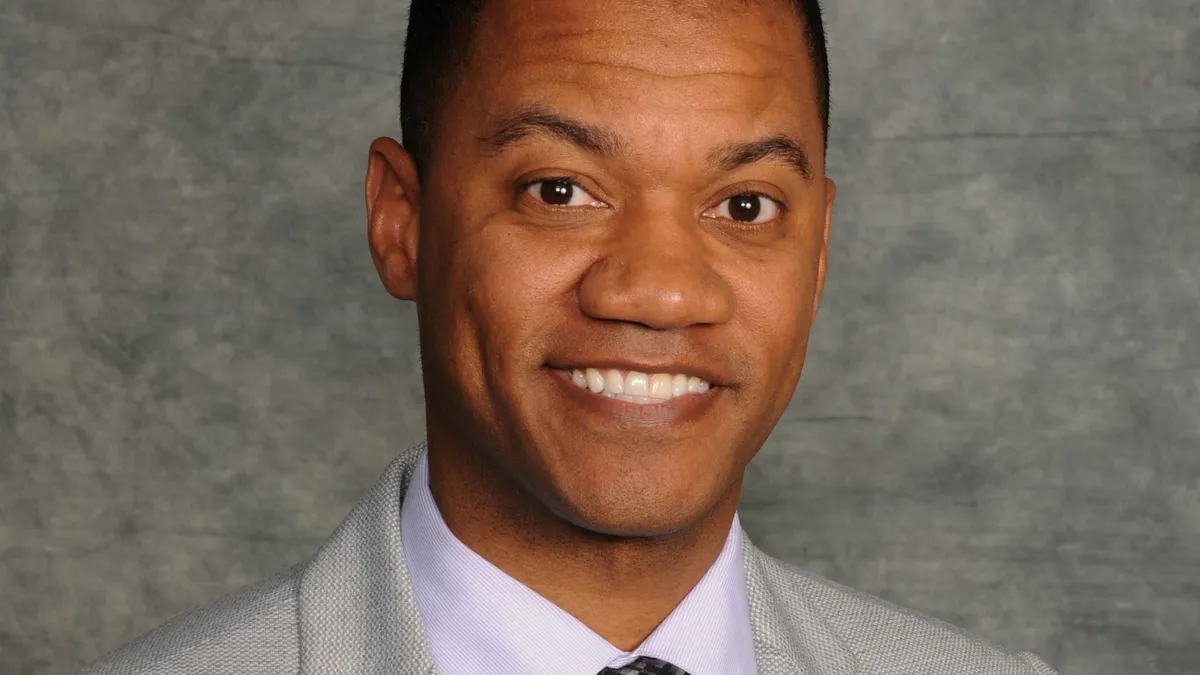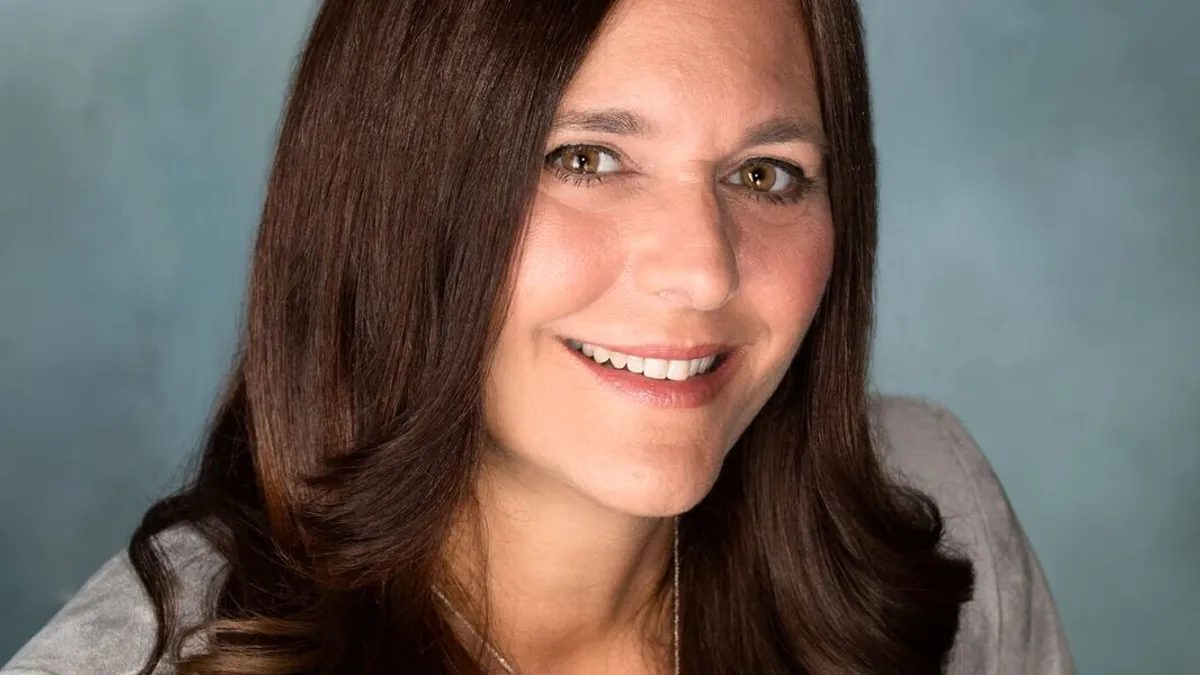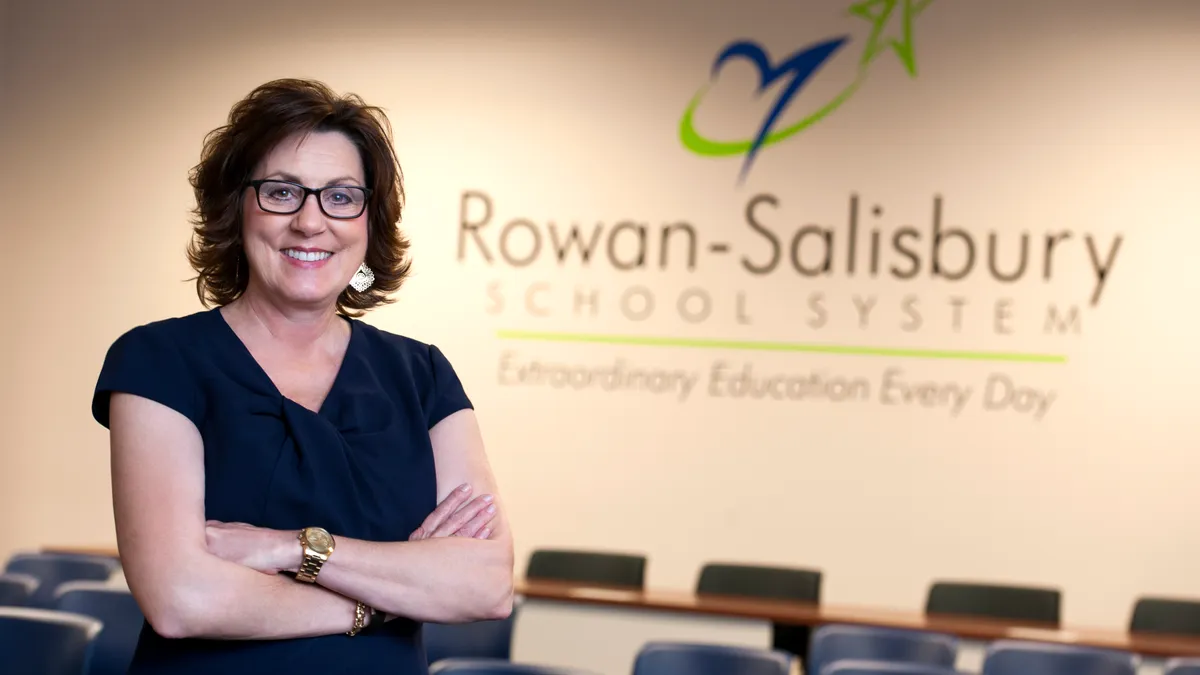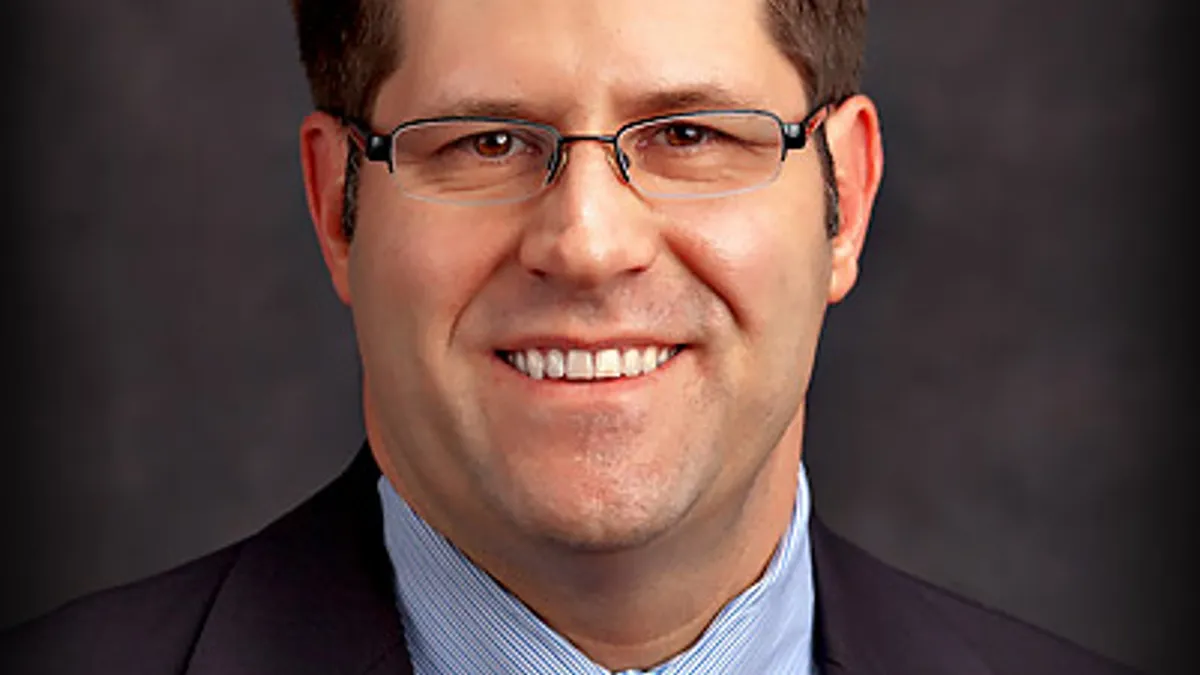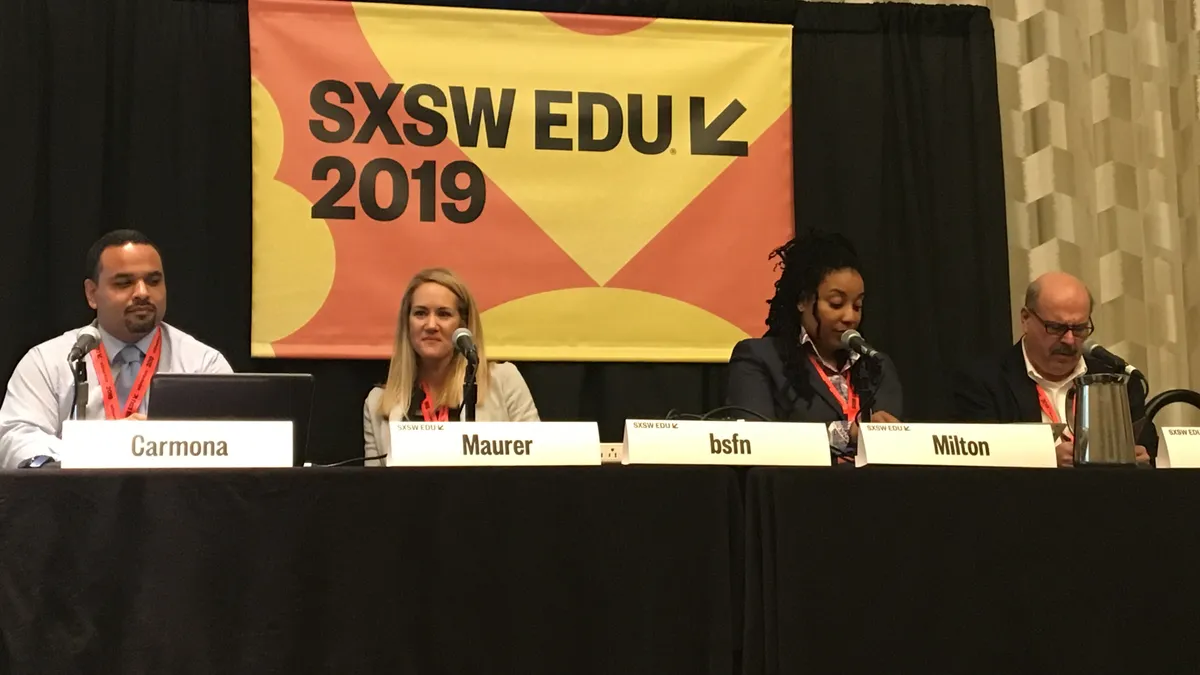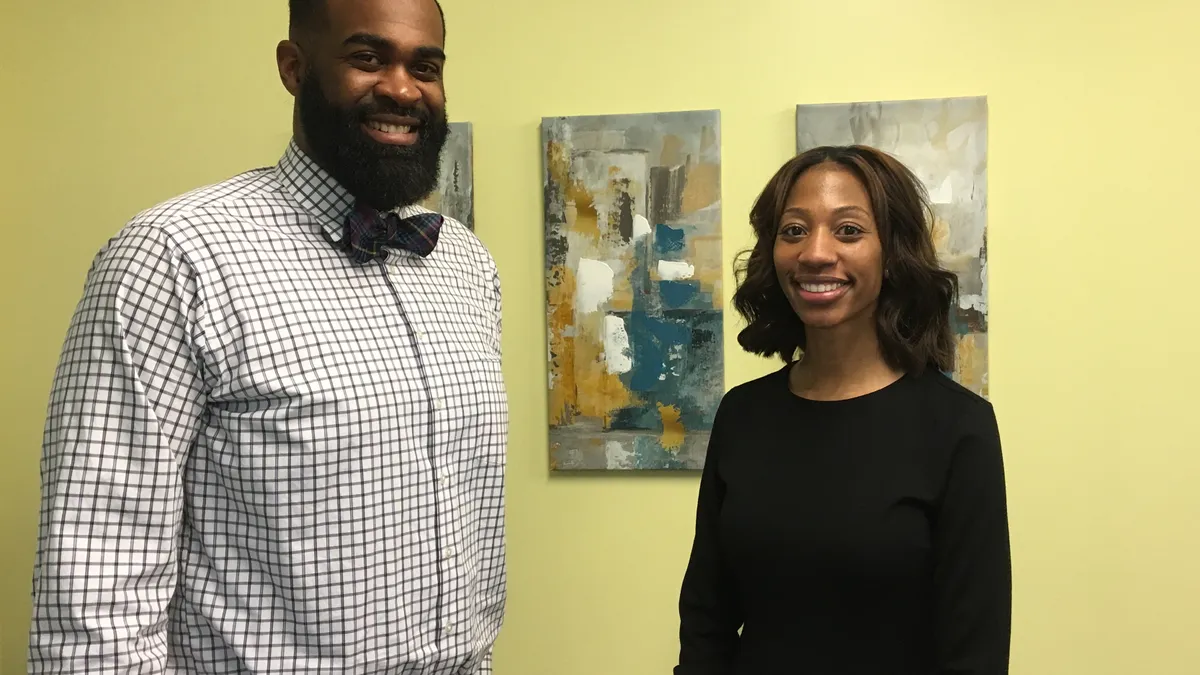Lessons In Leadership is an ongoing series in which K-12 principals and superintendents share their best practices and challenges overcome. For more installments, click here.
Hamish Brewer's long path to becoming the tattooed, skateboarding principal of Fred Lynn Middle School in Woodbridge, Va., is continually characterized by relentless passion in the face of adversity. Growing up in New Zealand in a broken home, his background isn't all that recognizable from that of many of the students he's served.
"I grew up around too much drugs and alcohol and things like that, and thought it was normal right up until I realized I couldn't have play dates," Brewer told Education Dive during a recent visit to his school. "Stuff was happening in the house that wasn't normal, and I struggled at high school. I failed exams and repeated years ... and too many people kept saying, 'You're not smart enough. You can't do this,' or 'You can't do that.'"
To make a long story short, hearing those words too many times lit a fire in Brewer that pushed him to prove everyone wrong. He discovered a passion for teaching and a desire to be the kind of educator he didn't have. Over the course of our conversation, Brewer shared what drives his unconventional leadership style — which includes skateboarding down his building's hallways, now redecorated with graffiti — as well as the importance of authenticity in any approach and how he sells his superintendent on his strategies.
EDITOR'S NOTE: The following interview has been edited for brevity and clarity.
EDUCATION DIVE: What inspires your approach to education?
HAMISH BREWER: I've just given my whole life to giving and trying to help my community. That's what I'm passionate about. I want to go into the worst situations and be the difference. I want to go in and show the whole world what you can do. When I was young, I fell in love with "Sister Act" and "Lean on Me." I just craved it, you know? And I felt wanted, I felt needed, and I felt like I could make a difference, 'cause it's easy, right? It's easy to not come in and do this kind of work. You could choose to go anywhere.
Title I's always been my thing, school improvement. And so I came to Prince William as an assistant principal, and then since being principal — this is my eighth year or seventh year of being a principal now — we turned Occoquan [Elementary] around. We turned that into a beast, a nationally distinguished Title I school, the very first in Prince William, which is crazy to think when you have 100 schools. We've never had one before.
We did that, and that was the ultimate team award. One of my favorite things is building a team, building a group of people that will go through an absolute brick wall for each other and kids, and openly say, "Yeah, we're coming for everybody." We're so proud of what we do. It's like when I came here [to Fred Lynn], Occoquan fed to this school.
I was watching what was happening, and it bothered me, the things that were being said or how the community was perceived. Much of it was true. Let's not BS this. It was all true, you know? You could read about this place, and it was really true. So, once we'd done everything, I'm like, "Who am I to sit there and not put my hand up and say, 'Let's go?'"
I'm BS if I don't. I need to put my hand up and be part of it. There's people that wanna see you fail. There's people that don't like that you're pushing back and you're a maverick and you're disrupting the norm. People don't like change, you know?
Education needs to change. It's archaic. It's crazy. We're asking kids to do stuff in a world that doesn't look like this anymore. I get really frustrated because education should be the front of innovation, but it's on the back foot. My whole thing's been, "We're not gonna be on the back foot. We're gonna be on the front foot. We're gonna show what innovation can look like, and get away from testing and worksheets and textbooks and all that."
I've got the whole "one more round" philosophy. I have a boxing ring [painted on the wall] down there. Who comes into one of the toughest schools in Virginia and puts a boxing ring right up in the middle of it? Did you know we've never had one ounce of trouble wherever I've put that? But you know what we've taught? We've taught kids "one more round." We've taught kids not to quit.
Life doesn't give you a handout. Our kids don't get handouts, so we're not giving them a handout in here. They're gonna earn it, and they're gonna be proud of what they earned and proud of what they do.
How important is that process of learning that it's okay to fail and moving forward and succeeding against those odds when turning around a school and inspiring kids, even in the face of a standardized testing culture that doesn't necessarily promote that?
BREWER: I've always believed if we're on fire and we're bringing it every day, that what we're doing every day will outweigh anything that happens at the end of the year. I roll the dice. I bank on my teachers and that our instruction is better than anything they'll see in an exam, because an exam's a minimal proficiency test. It's not a test of true academics. It's a test of minimal proficiency. My kids are not minimal proficiency. We're not here to be average. We're here to be amazing. I believe my kids can learn.
I've never met a kid that can't learn, dude. You show me a kid that can't learn, I've just met a teacher that gave up on 'em. Our kids can learn, and so I believe that if we had engaging, on-fire practices every single day, we'll beat that any day of the week. We should crush that, 'cause when you're teaching to a test, you're teaching to minimal. But if you're teaching to authentic, relevant learning experiences every day and you're engaging your kids, you're challenging your kids to problem solve, to critical think, to hold themselves accountable and take pride in their outcome? You crush that any day. We're showing it.
You're always like, "How do you get kids to read?" Well, get them to read. You know what we do? We did worksheets. We did stuff that unengaged them. In my last two schools, I built complete book rooms full of books that kids can engage in for focused instructional reading. Give your teachers the tools to be successful. Hire amazing people that believe the same stuff, too.
Every kid deserves a voice. Part of the reason I skateboard everywhere is because I wanna show them that anybody deserves a voice. When we were young, growing up, skateboarders were bad news, like, "Don't hang out with them. You're not allowed to."
What's the one sign in front of every school around? "No skateboarding allowed." You know what? In education, all we're doing all the time is telling kids "no." That kid should be pushing back, like, "Why are you saying no, we're not allowed to do this?" We're pushing back and saying, "Why not?"
I'll never forget meeting a guy in Thailand. I was rock climbing, lead rope climbing. We were just talking about life, and he just kept saying, "Why not?" I was like, "Dang, you're right. Why not? Why are we sitting back? Why am I not doing what I need to do? Why am I not talking to that girl 'cause I'm scared to? Why not? I can. What's the worst that can happen? No? Fail? Well, fail forward and keep rolling."
So yeah, man. That's what we live and breathe every day, bro. If you're on fire each and every day, you're gonna out-compete any of that stuff and teach the curriculum.
How does your approach to leadership appeal to students, and how important is authenticity overall in engaging them? With a lot of principals, you could try to be the "cool" principal or whatever, but in a lot of cases, that doesn't come off as authentic. But you're just yourself.
BREWER: The one time I tried not to be me, and I tried to be something I thought everybody wanted, I failed. I struggled, you know? I think you can't serve somebody you think you're better than. It starts right there. You can't think you're better than any of these people. You can't think you're better than the parents or whoever comes in. Treat everybody with respect. Be humble about it. Show 'em how much you care. It's the same with kids. I tell kids all the time, "I don't like what you did. I still love you, I just don't like what you did." You know what I mean?
I tell 'em every day I love 'em on the speaker, "If somebody didn't tell you today they love you, Mr. Brewer is." You build respect. You build relationships. Every person deserves a voice, but it starts with treating people the right way. It starts with accountability, with being honest. Everybody knows that I'm all-in for kids. I ask myself, when I look in the mirror, every decision I make, "Was I better for kids?"
People get behind that, and people build trust, and you work together. You can have tough conversations, 'cause it's about kids. It's not about us. It's about the kids. That's why I put my office in the middle of the school. I want kids to know they can come through here. They come and sit here all the time and chill. Some kids'll walk in and be like, "Mr. Brewer, I just need to chill before I get mad." I'm like, "Come on in, man."
Or, if someone's mad, I'll say, "Sit down. I'll talk to you when you're ready to. Lemme know." I ignore them. And then they're like, "All right Mr. Brewer, I want to talk now," and then we'll have a great conversation about what happened.
But it's that kind of mentality, and they see me being me and they see me giving my everything to them. They see my individuality. They get to be their individual. A lot of people chase down some stupid things and they take away individuality and character. Don't do it, you know?
I talk a lot about opportunity vs. obligation. My kids are not an obligation to me. Every single one of these kids is an opportunity. I wanna make sure I act on that, and if you don't like what I gotta say, that's cool, too. I'm doing my thing and it's not gonna change, you know? My whole life, I've been that way: a disruptor, maverick, go against the grain when I don't think it's right. I've always stood up for the underdog, that gang mentality that we protect each other, and I bring that to my school, my kids and my teachers. It shines through.
We talk about our school as a fortress. We're building a fortress here. Our main T-shirt, on the back, has, "Protect the wall. Protect the hive." That's how we talk about our school. How are other people talking about their school?
Kids can tell when someone's BSing them. Kids won't perform for people they don't like. Kids see right through that.
Think back when you were at school, man. You knew which teachers cared about you and which didn't, and you just knew straight off the bat. Those relationships are really important to me.
Bring the community back. I make everything free. I want my people to participate, and I don't ask them for nothing. Everybody wants to know, "How do you do parent engagement?" Stop asking them to pay for stuff! Let 'em participate. That's my job, to provide, you know? And so, I get hundreds to turn out to everything. We have volleyball and I get a packed stadium.
That goes to a lot of the funding issues that schools have. What are some of the tougher funding challenges that you have to address and how do you compensate for that?
BREWER: It's when funds start getting cut for programs that help kids directly — like, if I lose a coach or reading specialist, that's the stuff that frustrates me. When I lose those kinds of resources that impact children, you know? We're a little more fortunate, because we have such high poverty in our school that you become a priority.
We feed our kids breakfast, lunch and dinner, but that's the sad thing. I don't like seeing when government takes money out of education because, really, if we wanna be successful as a country and nation, we're gonna be as successful as what we put into education. If you keep taking out, there's a tipping point. There's a point of no return. Your investment is only gonna be so good.
I wish we had more flexibility. I get some great grants, but they're very strict and rigid. If I see a better way to do it, I shouldn't have to write a 40-page document to get it balanced or to make a change. It should be, "That principal saw a way to be better. Let's help that. Let him run," you know? Have a different form of accountability like that.
But it's getting tougher and tougher. What are we doing to attract teachers? We're in the middle of a teacher shortage, but this is what we're saying to new teachers: "Come be a teacher. We're gonna give you more paperwork, more meetings. You're dealing with students and trauma and all these things, and we're only gonna pay you this much."
We gotta start taking care of our teachers, giving people a reason to be a part of all the things that are great about education, which is making a difference, inspiring kids, and teaching kids to learn. There's teachers that can't even afford to live in the areas that they work. Let's start being smart. It doesn't always work, but if I've got a space rocket engineer, they could be an amazing science teacher, but they gotta go get a teaching degree.
Why can't we find an avenue for someone like that who might be an amazing opportunity in our classrooms? Just think differently about what we're doing with education, because school's only gotten harder. Our kids come into school with more and more trauma. They come into school in more poverty. It's tough being a kid today. The impact of social media — and I love social media, I'm all over it — that's not any easier on them right now, you know?
The other thing that worries me is you have suicide. Our kids are doing stuff to themselves. We need more guidance counselors. We need more help for our kids. All too often, we're looking for education to be the answer to all these things, but with less. It's frustrating.
What are the most impressive results that you've seen in any of the schools that you've led? What stands out to you the most that you're the most proud of?
BREWER: The things that stand out to me the most is what the parents and kids say. Yeah, I've got really high exam results. That stuff's cool. But seeing this community love their school again, be proud of their school — we've had an extra 150 kids come back to the school this year. I'm most proud of the fact that parents want their kids back in our school. They trust us. We gave a school hope again, and we gave back a school to its community, bro. That's the result for me. Nothing else matters, man.
Kids that felt they weren't believed in are feeling belief again and taking pride in their academics, taking pride in themselves as people again, 'cause their journey's a journey. It's not about just this one result right now. This is great, but I wanna know what do they look like when they're parents, when they're moms and dads. What do they look like when they go out into the world? That's the success. I'll give it all.
You have no idea the satisfaction I feel showing the whole world that we made it. We don't have the discipline [issues]. We don't have all these things going on that were once going on. It's all gone, and we gave back the school to the community. The community feels whole again. People come up, "Man, thank you for what you did to my old school."
Dude, I think [the parents] would tackle me if I went anywhere. My parents will go through a brick wall for me. They support me, I support them. That's all-in. It's family, bro. We don't enroll students here. We enroll families. We take stuff to a whole 'nother level. That's a way to be a part of something more special, something bigger. Turning around a school is not just academics. It's bigger than that. That's BS if you're just going in there to go, "Hey, let's get some results." Someone's sending their kids to us, bro.
Parents want their kids to feel loved and nourished and taken care of, that they're learning reading, writing and math. "My kid is safe." That's what they want, man. And they wanna be proud of their school. We've created a beast again.
With spray painting the walls and the skateboarding and things like that, have you ever had any sort of trouble selling the superintendent or the school board on anything?
BREWER: No. You know what? I'm gone into the places I've been and made a difference. That helps. If I go in and I'm BS, if this is all a gimmick, it won't work. If it was a gimmick, if I was superintendent, I'd be like, "You can't do that." But it's not a gimmick. It's real, and it's tangible. It's change, and it represents the kids. If I go somewhere else, maybe it looks different again. But results breed results, you know?
I have a "why" behind everything. I change out all the light bulbs because I don't want my kids sitting under yellow bulbs, bored, falling asleep. They feel lethargic. They're not inspired. School shouldn't look stale and sterile. They're not hospitals from the '40s, so when you look around, this is really, really important. The words, the vocabulary and the images become the expectation of your school. You walk down my hallway — and I'm gonna show you in a minute, look what you see. How can you not be fired up and inspired?
You're seeing game-changers, rule-breakers, leaders, people that have inspired. Maybe you don't like that one, but that's cool. That's the point. It creates energy. It creates conversation.
My kids see "Relentless" every day from me, right? Then, they start thinking about the word that they're looking for. What's their one word? What are they all about? All of our teachers do one word with our kids, "What's your one word?" So, we teach our kids character traits. We teach them legacy. "What do you want to be remembered for?" That's what all this is tied to: "Who are you as a person?"
Most of the time, people don't know how to answer that. People are not having that conversation. But, if we start right there, that's where ownership happens, you know? They start owning it like, "Hold on a minute. Yeah!" I'll tell a kid, "Is that how you want to be remembered? Is that how you want people to think of you?" That's a real conversation, rather than, "Oh, you're outgoing," right? We're having real conversations.


